

What Is Creative Writing? (Ultimate Guide + 20 Examples)
Creative writing begins with a blank page and the courage to fill it with the stories only you can tell.
I face this intimidating blank page daily–and I have for the better part of 20+ years.
In this guide, you’ll learn all the ins and outs of creative writing with tons of examples.
What Is Creative Writing (Long Description)?
Creative Writing is the art of using words to express ideas and emotions in imaginative ways. It encompasses various forms including novels, poetry, and plays, focusing on narrative craft, character development, and the use of literary tropes.

Table of Contents
Let’s expand on that definition a bit.
Creative writing is an art form that transcends traditional literature boundaries.
It includes professional, journalistic, academic, and technical writing. This type of writing emphasizes narrative craft, character development, and literary tropes. It also explores poetry and poetics traditions.
In essence, creative writing lets you express ideas and emotions uniquely and imaginatively.
It’s about the freedom to invent worlds, characters, and stories. These creations evoke a spectrum of emotions in readers.
Creative writing covers fiction, poetry, and everything in between.
It allows writers to express inner thoughts and feelings. Often, it reflects human experiences through a fabricated lens.
Types of Creative Writing
There are many types of creative writing that we need to explain.
Some of the most common types:
- Short stories
- Screenplays
- Flash fiction
- Creative Nonfiction
Short Stories (The Brief Escape)
Short stories are like narrative treasures.
They are compact but impactful, telling a full story within a limited word count. These tales often focus on a single character or a crucial moment.
Short stories are known for their brevity.
They deliver emotion and insight in a concise yet powerful package. This format is ideal for exploring diverse genres, themes, and characters. It leaves a lasting impression on readers.
Example: Emma discovers an old photo of her smiling grandmother. It’s a rarity. Through flashbacks, Emma learns about her grandmother’s wartime love story. She comes to understand her grandmother’s resilience and the value of joy.
Novels (The Long Journey)
Novels are extensive explorations of character, plot, and setting.
They span thousands of words, giving writers the space to create entire worlds. Novels can weave complex stories across various themes and timelines.
The length of a novel allows for deep narrative and character development.
Readers get an immersive experience.
Example: Across the Divide tells of two siblings separated in childhood. They grow up in different cultures. Their reunion highlights the strength of family bonds, despite distance and differences.
Poetry (The Soul’s Language)
Poetry expresses ideas and emotions through rhythm, sound, and word beauty.
It distills emotions and thoughts into verses. Poetry often uses metaphors, similes, and figurative language to reach the reader’s heart and mind.
Poetry ranges from structured forms, like sonnets, to free verse.
The latter breaks away from traditional formats for more expressive thought.
Example: Whispers of Dawn is a poem collection capturing morning’s quiet moments. “First Light” personifies dawn as a painter. It brings colors of hope and renewal to the world.
Plays (The Dramatic Dialogue)
Plays are meant for performance. They bring characters and conflicts to life through dialogue and action.
This format uniquely explores human relationships and societal issues.
Playwrights face the challenge of conveying setting, emotion, and plot through dialogue and directions.
Example: Echoes of Tomorrow is set in a dystopian future. Memories can be bought and sold. It follows siblings on a quest to retrieve their stolen memories. They learn the cost of living in a world where the past has a price.
Screenplays (Cinema’s Blueprint)
Screenplays outline narratives for films and TV shows.
They require an understanding of visual storytelling, pacing, and dialogue. Screenplays must fit film production constraints.
Example: The Last Light is a screenplay for a sci-fi film. Humanity’s survivors on a dying Earth seek a new planet. The story focuses on spacecraft Argo’s crew as they face mission challenges and internal dynamics.
Memoirs (The Personal Journey)
Memoirs provide insight into an author’s life, focusing on personal experiences and emotional journeys.
They differ from autobiographies by concentrating on specific themes or events.
Memoirs invite readers into the author’s world.
They share lessons learned and hardships overcome.
Example: Under the Mango Tree is a memoir by Maria Gomez. It shares her childhood memories in rural Colombia. The mango tree in their yard symbolizes home, growth, and nostalgia. Maria reflects on her journey to a new life in America.
Flash Fiction (The Quick Twist)
Flash fiction tells stories in under 1,000 words.
It’s about crafting compelling narratives concisely. Each word in flash fiction must count, often leading to a twist.
This format captures life’s vivid moments, delivering quick, impactful insights.
Example: The Last Message features an astronaut’s final Earth message as her spacecraft drifts away. In 500 words, it explores isolation, hope, and the desire to connect against all odds.
Creative Nonfiction (The Factual Tale)
Creative nonfiction combines factual accuracy with creative storytelling.
This genre covers real events, people, and places with a twist. It uses descriptive language and narrative arcs to make true stories engaging.
Creative nonfiction includes biographies, essays, and travelogues.
Example: Echoes of Everest follows the author’s Mount Everest climb. It mixes factual details with personal reflections and the history of past climbers. The narrative captures the climb’s beauty and challenges, offering an immersive experience.
Fantasy (The World Beyond)
Fantasy transports readers to magical and mythical worlds.
It explores themes like good vs. evil and heroism in unreal settings. Fantasy requires careful world-building to create believable yet fantastic realms.
Example: The Crystal of Azmar tells of a young girl destined to save her world from darkness. She learns she’s the last sorceress in a forgotten lineage. Her journey involves mastering powers, forming alliances, and uncovering ancient kingdom myths.
Science Fiction (The Future Imagined)
Science fiction delves into futuristic and scientific themes.
It questions the impact of advancements on society and individuals.
Science fiction ranges from speculative to hard sci-fi, focusing on plausible futures.
Example: When the Stars Whisper is set in a future where humanity communicates with distant galaxies. It centers on a scientist who finds an alien message. This discovery prompts a deep look at humanity’s universe role and interstellar communication.
Watch this great video that explores the question, “What is creative writing?” and “How to get started?”:
What Are the 5 Cs of Creative Writing?
The 5 Cs of creative writing are fundamental pillars.
They guide writers to produce compelling and impactful work. These principles—Clarity, Coherence, Conciseness, Creativity, and Consistency—help craft stories that engage and entertain.
They also resonate deeply with readers. Let’s explore each of these critical components.
Clarity makes your writing understandable and accessible.
It involves choosing the right words and constructing clear sentences. Your narrative should be easy to follow.
In creative writing, clarity means conveying complex ideas in a digestible and enjoyable way.
Coherence ensures your writing flows logically.
It’s crucial for maintaining the reader’s interest. Characters should develop believably, and plots should progress logically. This makes the narrative feel cohesive.
Conciseness
Conciseness is about expressing ideas succinctly.
It’s being economical with words and avoiding redundancy. This principle helps maintain pace and tension, engaging readers throughout the story.
Creativity is the heart of creative writing.
It allows writers to invent new worlds and create memorable characters. Creativity involves originality and imagination. It’s seeing the world in unique ways and sharing that vision.
Consistency
Consistency maintains a uniform tone, style, and voice.
It means being faithful to the world you’ve created. Characters should act true to their development. This builds trust with readers, making your story immersive and believable.
Is Creative Writing Easy?
Creative writing is both rewarding and challenging.
Crafting stories from your imagination involves more than just words on a page. It requires discipline and a deep understanding of language and narrative structure.
Exploring complex characters and themes is also key.
Refining and revising your work is crucial for developing your voice.
The ease of creative writing varies. Some find the freedom of expression liberating.
Others struggle with writer’s block or plot development challenges. However, practice and feedback make creative writing more fulfilling.
What Does a Creative Writer Do?
A creative writer weaves narratives that entertain, enlighten, and inspire.
Writers explore both the world they create and the emotions they wish to evoke. Their tasks are diverse, involving more than just writing.
Creative writers develop ideas, research, and plan their stories.
They create characters and outline plots with attention to detail. Drafting and revising their work is a significant part of their process. They strive for the 5 Cs of compelling writing.
Writers engage with the literary community, seeking feedback and participating in workshops.
They may navigate the publishing world with agents and editors.
Creative writers are storytellers, craftsmen, and artists. They bring narratives to life, enriching our lives and expanding our imaginations.
How to Get Started With Creative Writing?
Embarking on a creative writing journey can feel like standing at the edge of a vast and mysterious forest.
The path is not always clear, but the adventure is calling.
Here’s how to take your first steps into the world of creative writing:
- Find a time of day when your mind is most alert and creative.
- Create a comfortable writing space free from distractions.
- Use prompts to spark your imagination. They can be as simple as a word, a phrase, or an image.
- Try writing for 15-20 minutes on a prompt without editing yourself. Let the ideas flow freely.
- Reading is fuel for your writing. Explore various genres and styles.
- Pay attention to how your favorite authors construct their sentences, develop characters, and build their worlds.
- Don’t pressure yourself to write a novel right away. Begin with short stories or poems.
- Small projects can help you hone your skills and boost your confidence.
- Look for writing groups in your area or online. These communities offer support, feedback, and motivation.
- Participating in workshops or classes can also provide valuable insights into your writing.
- Understand that your first draft is just the beginning. Revising your work is where the real magic happens.
- Be open to feedback and willing to rework your pieces.
- Carry a notebook or digital recorder to jot down ideas, observations, and snippets of conversations.
- These notes can be gold mines for future writing projects.
Final Thoughts: What Is Creative Writing?
Creative writing is an invitation to explore the unknown, to give voice to the silenced, and to celebrate the human spirit in all its forms.
Check out these creative writing tools (that I highly recommend):
Read This Next:
- What Is a Prompt in Writing? (Ultimate Guide + 200 Examples)
- What Is A Personal Account In Writing? (47 Examples)
- How To Write A Fantasy Short Story (Ultimate Guide + Examples)
- How To Write A Fantasy Romance Novel [21 Tips + Examples)
- Student Hacks
- Studying & Revision
- Work & Jobs
GCSE English language: 10+ tips for creative writing

On paper creative writing should be one of the easiest parts of the English language GCSE but you're not alone if you're finding it tricky.
Creative Writing in GCSE exams can take various forms: You may have to tell an entire short story or you could be asked to write a description of a picture.
Here's some top tips when it comes to dealing with your creative writing headaches...
Understanding the Exam Format
First and foremost, it's essential to familiarise yourself with the GCSE English Language exam format. Creative writing usually forms a significant part of the assessment, often as part of a coursework component or in a specific section of the exam. Knowing what is expected in terms of length, format, and content can significantly boost your confidence and performance.
Reading Widely
One of the best ways to enhance your creative writing skills is to read a diverse range of literature. This exposure helps you understand different writing styles, narrative techniques, and genres. By reading extensively, you can develop a sense of what makes a story engaging and learn how to incorporate these elements into your own writing.
Practising Writing Regularly
Consistent practice is key in improving your writing skills. Try to write something every day, whether it's a short story, a descriptive piece, or even just a diary entry. This not only helps improve your writing style and vocabulary but also keeps your creative juices flowing.
Answer The Question
Read it VERY carefully because your answer will only be marked in the context of what was actually asked in the first place, regardless of how well written your piece may have been. Pay special attention to the type of creative writing you're asked to come up with and it's audience (see more below).
Developing Strong Characters and Settings
In creative writing, characters and settings are the heart of your story. Spend time developing characters who are believable and relatable. Similarly, create settings that are vivid and contribute to the mood of the story. Using descriptive language and sensory details can bring your characters and settings to life.
READ MORE: > 10+ GCSE creative writing ideas, prompts and plot lines
Mastering Narrative Structure
A good story has a clear structure - a beginning, middle, and end. The beginning should hook the reader, the middle should build the story, and the end should provide a satisfying conclusion. Think about the plot and how you can weave tension, conflict, and resolution into your narrative.
Showing, Not Telling
'Show, don’t tell' is a golden rule in creative writing. Instead of simply telling the reader what is happening, show them through actions, thoughts, senses, and feelings. For example, rather than simply telling the reader a character is tall, show them that in your writing: "He towered above me like a skyscraper." This approach makes your writing more engaging and immersive.
Take Inspiration From Real Life
Write more convincingly by taking inspiration from your real life experiences and feelings, embellishing where necessary.
Go Out of This World
If you're given a prompt to write the opening of a story involving a storm, it doesn't need to be a storm on earth. Going out of this world allows you to be really descriptive in your language and paint a picture of a completely unique world or species.
Varying Sentence Structure and Vocabulary
Using a range of sentence structures and a rich vocabulary can make your writing more interesting and dynamic. Avoid repetition of words and phrases, and try to use descriptive language that paints a picture for the reader. Consider the senses such as what you might hear, smell, feel or taste.
Don't Leave The Ending To The, Well, End
Some pieces will lend themselves to a nice, easy ending - and in some questions, the ending may even be provided for you - but other times it's not so simple to stop. When it comes to fictional stories, it may well be easier to plan your ending first and work backwards, you don't want to end on a whimper, in a rush or with leftover loose ends from the plot.
Editing and Proofreading
A vital part of writing is reviewing and refining your work. Always leave time to edit and proofread your writing. Look out for common errors like spelling mistakes, grammatical errors, and punctuation issues. Also, consider whether your writing flows logically and whether there's anything you can improve in terms of language and style.
Seeking Feedback
Don’t be afraid to ask teachers, friends, or family members for feedback on your writing. Constructive criticism can provide new perspectives and ideas that can help you improve your writing significantly.
Staying Calm and Confident
Lastly, it's important to stay calm and confident during your exam. Stress and anxiety can hinder your creativity and writing ability. Practice relaxation techniques and believe in your preparation to help you stay focused and composed during the exam.
Remember, creative writing is an opportunity to express yourself and let your imagination run wild. With these tips and consistent practice, you can excel in your GCSE English Language creative writing exam look forward to results day and enjoy the process of crafting your own unique stories.
Thomas Brella is the founder of Student Hacks, starting the website in 2013 while studying at the University of Brighton to share tips and tricks on life as a cash-strapped student. He's now spent over 10 years scoping out the best ways to live on a budget
Follow on Twitter
Like on facebook.

Elements of Creative Writing
J.D. Schraffenberger, University of Northern Iowa
Rachel Morgan, University of Northern Iowa
Grant Tracey, University of Northern Iowa
Copyright Year: 2023
ISBN 13: 9780915996179
Publisher: University of Northern Iowa
Language: English
Formats Available
Conditions of use.
Learn more about reviews.
Reviewed by Robert Moreira, Lecturer III, University of Texas Rio Grande Valley on 3/21/24
Unlike Starkey's CREATIVE WRITING: FOUR GENRES IN BRIEF, this textbook does not include a section on drama. read more
Comprehensiveness rating: 4 see less
Unlike Starkey's CREATIVE WRITING: FOUR GENRES IN BRIEF, this textbook does not include a section on drama.
Content Accuracy rating: 5
As far as I can tell, content is accurate, error free and unbiased.
Relevance/Longevity rating: 5
The book is relevant and up-to-date.
Clarity rating: 5
The text is clear and easy to understand.
Consistency rating: 5
I would agree that the text is consistent in terms of terminology and framework.
Modularity rating: 5
Text is modular, yes, but I would like to see the addition of a section on dramatic writing.
Organization/Structure/Flow rating: 5
Topics are presented in logical, clear fashion.
Interface rating: 5
Navigation is good.
Grammatical Errors rating: 5
No grammatical issues that I could see.
Cultural Relevance rating: 3
I'd like to see more diverse creative writing examples.
As I stated above, textbook is good except that it does not include a section on dramatic writing.
Table of Contents
- Introduction
- Chapter One: One Great Way to Write a Short Story
- Chapter Two: Plotting
- Chapter Three: Counterpointed Plotting
- Chapter Four: Show and Tell
- Chapter Five: Characterization and Method Writing
- Chapter Six: Character and Dialouge
- Chapter Seven: Setting, Stillness, and Voice
- Chapter Eight: Point of View
- Chapter Nine: Learning the Unwritten Rules
- Chapter One: A Poetry State of Mind
- Chapter Two: The Architecture of a Poem
- Chapter Three: Sound
- Chapter Four: Inspiration and Risk
- Chapter Five: Endings and Beginnings
- Chapter Six: Figurative Language
- Chapter Seven: Forms, Forms, Forms
- Chapter Eight: Go to the Image
- Chapter Nine: The Difficult Simplicity of Short Poems and Killing Darlings
Creative Nonfiction
- Chapter One: Creative Nonfiction and the Essay
- Chapter Two: Truth and Memory, Truth in Memory
- Chapter Three: Research and History
- Chapter Four: Writing Environments
- Chapter Five: Notes on Style
- Chapter Seven: Imagery and the Senses
- Chapter Eight: Writing the Body
- Chapter Nine: Forms
Back Matter
- Contributors
- North American Review Staff
Ancillary Material
- University of Northern Iowa
About the Book
This free and open access textbook introduces new writers to some basic elements of the craft of creative writing in the genres of fiction, poetry, and creative nonfiction. The authors—Rachel Morgan, Jeremy Schraffenberger, and Grant Tracey—are editors of the North American Review, the oldest and one of the most well-regarded literary magazines in the United States. They’ve selected nearly all of the readings and examples (more than 60) from writing that has appeared in NAR pages over the years. Because they had a hand in publishing these pieces originally, their perspective as editors permeates this book. As such, they hope that even seasoned writers might gain insight into the aesthetics of the magazine as they analyze and discuss some reasons this work is so remarkable—and therefore teachable. This project was supported by NAR staff and funded via the UNI Textbook Equity Mini-Grant Program.
About the Contributors
J.D. Schraffenberger is a professor of English at the University of Northern Iowa. He is the author of two books of poems, Saint Joe's Passion and The Waxen Poor , and co-author with Martín Espada and Lauren Schmidt of The Necessary Poetics of Atheism . His other work has appeared in Best of Brevity , Best Creative Nonfiction , Notre Dame Review , Poetry East , Prairie Schooner , and elsewhere.
Rachel Morgan is an instructor of English at the University of Northern Iowa. She is the author of the chapbook Honey & Blood , Blood & Honey . Her work is included in the anthology Fracture: Essays, Poems, and Stories on Fracking in American and has appeared in the Journal of American Medical Association , Boulevard , Prairie Schooner , and elsewhere.
Grant Tracey author of three novels in the Hayden Fuller Mysteries ; the chapbook Winsome featuring cab driver Eddie Sands; and the story collection Final Stanzas , is fiction editor of the North American Review and an English professor at the University of Northern Iowa, where he teaches film, modern drama, and creative writing. Nominated four times for a Pushcart Prize, he has published nearly fifty short stories and three previous collections. He has acted in over forty community theater productions and has published critical work on Samuel Fuller and James Cagney. He lives in Cedar Falls, Iowa.
Contribute to this Page
🎉 Our next novel writing master class starts in – ! Claim your spot →
WEEKLY WRITING PROMPTS
Join (probably?) the world's largest writing contest. Flex those creative muscles with weekly writing prompts.
Showing 2134 prompts
Action stations with tom bromley, write a story about a character driving and getting lost..
LIVE – Thriller and Suspense
Write a story about a tennis match between two rivals.
LIVE – Character
Write a story that begins with someone dancing in a bar.
Write a story around someone (literally) bumping into someone else..
LIVE – Funny
Write a story about a character running late for a job interview.
LIVE – Adventure

Introducing Prompted , a new magazine written by you!
🏆 Featuring 12 prize-winning stories from our community. Download it now for FREE .
Write a story titled 'Persuasion'.
Write a story titled 'the wind in the willows'., write a story titled 'desperate remedies'., write a story titled 'paradise lost'., write a story titled 'a tale of two cities'., subscribe to our prompts newsletter.
Never miss a prompt! Get curated writing inspiration delivered to your inbox each week.
Write a narrative about a group of scientists exploring the deepest parts of the ocean.
Imagine a world where exploration is forbidden, and write a story about a character who defies this rule to satisfy their innate curiosity., center your story around a character’s personal exploration, whether it's trying a new hobby, visiting an unfamiliar place, or learning something completely new., set your story on a spaceship exploring the far reaches of space when something goes wrong., write a story in the form of diary entries, written by an explorer as they make their way through what they thought was an untouched location., write about a character who treats everything like a game and struggles to be serious when they most need to, or vice versa., write a story about someone who takes a joke way too far., write a story about someone participating in a seemingly innocent game that suddenly takes a turn., set your story in a playground: two characters are having a serious conversation while on the seesaw/in the jungle gym/on the swings., write a story that includes the phrase “it’s all fun and games…”, win $250 in our short story competition 🏆.
We'll send you 5 prompts each week. Respond with your short story and you could win $250!
Contest #249 LIVE
Enter our weekly contest.
This week's theme: Action Stations with Tom Bromley
Prize money
Contest entries, closes at 23:59 - may 10, 2024 est, recent contests ✍️.
#248 – From the Top
#247 – The Great Unknown
#246 – All Fun and Games
#245 – Heavenly Bodies
Recent winners 🏆
Madeline McCourt – read
Sarah Coury – read
Olivier Breuleux – read
Kerriann Murray – read
Leaderboard 🥇
#1 Zilla Babbitt
32366 points
#2 Deidra Whitt Lovegren
28721 points
#3 Abigail Airuedomwinya
22420 points
#4 Graham Kinross
14501 points
#5 Scout Tahoe
13196 points
#6 Chris Campbell
11240 points
#7 Thom With An H
10613 points
#8 Rayhan Hidayat
10212 points
#9 Michał Przywara
9898 points
#10 Deborah Mercer
9610 points

Bring your short stories to life
Fuse character, story, and conflict with tools in the Reedsy Book Editor. 100% free.
Creative Writing Prompts
When the idea to start a weekly newsletter with writing inspiration first came to us, we decided that we wanted to do more than provide people with topics to write about. We wanted to try and help authors form a regular writing habit and also give them a place to proudly display their work. So we started the weekly Creative Writing Prompts newsletter. Since then, Prompts has grown to a community of more than 450,000 authors, complete with its own literary magazine, Prompted .
Here's how our contest works: every Friday, we send out a newsletter containing five creative writing prompts. Each week, the story ideas center around a different theme. Authors then have one week — until the following Friday — to submit a short story based on one of our prompts. A winner is picked each week to win $250 and is highlighted on our Reedsy Prompts page.
Interested in participating in our short story contest? Sign up here for more information! Or you can check out our full Terms of Use and our FAQ page .
Why we love creative writing prompts
If you've ever sat in front of a computer or notebook and felt the urge to start creating worlds, characters, and storylines — all the while finding yourself unable to do so — then you've met the author's age-old foe: writer's block. There's nothing more frustrating than finding the time but not the words to be creative. Enter our directory! If you're ready to kick writer's block to the curb and finally get started on your short story or novel, these unique story ideas might just be your ticket.
This list of 1800+ creative writing prompts has been created by the Reedsy team to help you develop a rock-solid writing routine. As all aspiring authors know, this is the #1 challenge — and solution! — for reaching your literary goals. Feel free to filter through different genres, which include...
Dramatic — If you want to make people laugh and cry within the same story, this might be your genre.
Funny — Whether satire or slapstick, this is an opportunity to write with your funny bone.
Romance — One of the most popular commercial genres out there. Check out these story ideas out if you love writing about love.
Fantasy — The beauty of this genre is that the possibilities are as endless as your imagination.
Dystopian – Explore the shadowy side of human nature and contemporary technology in dark speculative fiction.
Mystery — From whodunnits to cozy mysteries, it's time to bring out your inner detective.
Thriller and Suspense — There's nothing like a page-turner that elicits a gasp of surprise at the end.
High School — Encourage teens to let their imaginations run free.
Want to submit your own story ideas to help inspire fellow writers? Send them to us here.
After you find the perfect story idea
Finding inspiration is just one piece of the puzzle. Next, you need to refine your craft skills — and then display them to the world. We've worked hard to create resources that help you do just that! Check them out:
- How to Write a Short Story That Gets Published — a free, ten-day course by Laura Mae Isaacman, a full-time editor who runs a book editing company in Brooklyn.
- Best Literary Magazines of 2023 — a directory of 100+ reputable magazines that accept unsolicited submissions.
- Writing Contests in 2023 — the finest contests of 2021 for fiction and non-fiction authors of short stories, poetry, essays, and more.
Beyond creative writing prompts: how to build a writing routine
While writing prompts are a great tactic to spark your creative sessions, a writer generally needs a couple more tools in their toolbelt when it comes to developing a rock-solid writing routine . To that end, here are a few more additional tips for incorporating your craft into your everyday life.
- NNWT. Or, as book coach Kevin Johns calls it , “Non-Negotiable Writing Time.” This time should be scheduled into your routine, whether that’s once a day or once a week. Treat it as a serious commitment, and don’t schedule anything else during your NNWT unless it’s absolutely necessary.
- Set word count goals. And make them realistic! Don’t start out with lofty goals you’re unlikely to achieve. Give some thought to how many words you think you can write a week, and start there. If you find you’re hitting your weekly or daily goals easily, keep upping the stakes as your craft time becomes more ingrained in your routine.
- Talk to friends and family about the project you’re working on. Doing so means that those close to you are likely to check in about the status of your piece — which in turn keeps you more accountable.
Arm yourself against writer’s block. Writer’s block will inevitably come, no matter how much story ideas initially inspire you. So it’s best to be prepared with tips and tricks you can use to keep yourself on track before the block hits. You can find 20 solid tips here — including how to establish a relationship with your inner critic and apps that can help you defeat procrastination or lack of motivation.
NEW VIDEO COURSE 🎉
How to Write a Novel
Join Tom Bromley for a writing master class and finish your first draft in 3 months . Learn more →
Explore more writing prompt ideas:
Adults Writing Prompts ⭢
Adventure Writing Prompts ⭢
Angst Writing Prompts ⭢
Character Writing Prompts ⭢
Christmas Writing Prompts ⭢
Dark Writing Prompts ⭢
Dialogue Writing Prompts ⭢
Dramatic Writing Prompts ⭢
Dystopian Writing Prompts ⭢
Fall Writing Prompts ⭢
Fantasy Writing Prompts ⭢
Fiction Writing Prompts ⭢
Fluff Writing Prompts ⭢
Funny Writing Prompts ⭢
Halloween Writing Prompts ⭢
High School Writing Prompts ⭢
Historical Fiction Writing Prompts ⭢
Holiday Writing Prompts ⭢
Horror Writing Prompts ⭢
Kids Writing Prompts ⭢
Middle School Writing Prompts ⭢
Mystery Writing Prompts ⭢
Narrative Writing Prompts ⭢
Nonfiction Writing Prompts ⭢
Novel Writing Prompts ⭢
Poetry Writing Prompts ⭢
Romance Writing Prompts ⭢
Sad Writing Prompts ⭢
Science Fiction Writing Prompts ⭢
Short Story Writing Prompts ⭢
Spring Writing Prompts ⭢
Summer Writing Prompts ⭢
Teens Writing Prompts ⭢
Thanksgiving Writing Prompts ⭢
Thriller and Suspense Writing Prompts ⭢
Valentine's Day Writing Prompts ⭢
Vampire Writing Prompts ⭢
Winter Writing Prompts ⭢
Oops, you need an account for that!
Log in with your social account:
Or enter your email:
You are using an outdated browser. Please upgrade your browser or activate Google Chrome Frame to improve your experience.
9 Creative English Writing Exercises Perfect for Learners
Think about all the different things we write: Social media posts, school assignments, work reports, text messages, emails and so on.
There’s no getting away from writing! That’s why learning to write in English is just as important as learning to speak.
In the age of the internet, it may seem strange to focus on writing when everyone can write however they want online. But not all the writing you do will be online or in informal English .
That just makes it even more important to learn how to write properly. In order to break the rules, you first need to learn them!
What’s more, writing in English helps you improve many other language skills. So here are nine fun English writing exercises to help you practice!
1. Vocabulary story
2. picture story, 3. structured summary, 4. devil’s advocate, 5. idiom soup, 6. it was a dark and stormy night, 7. story of my life, 8. how to breathe, 9. the silly job interview, how writing improves your english skills, and one more thing....
Download: This blog post is available as a convenient and portable PDF that you can take anywhere. Click here to get a copy. (Download)
Do you have a list of English words you’re learning? If you do, great! If you don’t, grab one from here or here .
Now, write a story using as many of the words on the list as you can. Aim to include 10-20 words in your story, depending on how much time you have for this exercise.
Have some fun with it and try to get the finished story to make sense!
When your story is finished, you can share it with friends or on a blog. Encourage readers to point out any mistakes you made.
What you’ll learn:
This exercise will help you better understand and remember vocabulary words for a number of reasons. Here are a few:
- Using words in a sentence helps you learn how to use them correctly.
- Remembering words is easier in context (with some other words around them). In fact, the sillier your story, the more easily you’ll remember the words!
- Writing things down activates a certain part of your brain that helps you remember vocabulary words better.
Grab the closest magazine to you and choose a random picture. If you don’t have a magazine, you can use this random image generator .
Describe the photo in as much detail as you can. Don’t just write what you see! Imagine that you are in the picture. Think about what you would smell, feel or even taste.
You’ll learn more about adjectives , feelings and perceptions (how we see and experience the world).
Further, we use descriptions in our daily life all the time: “I’m tired;” “Her dress is so stylish;” “This mocha tastes amazing!” Descriptions like these are used often in both written and conversational English!
Think about the last book you read or the last movie you watched. Summarize it (say what happened briefly) using this formula:
[Somebody] wanted … but … so …
Confused? Here’s what it looks like in action:
Bruce Wayne wanted to save Gotham but supervillains were trying to destroy it, so he trained hard and became Batman.
Recognize that story? That’s a summary of the movie “Batman Begins.”
To use the formula in the same way, just fill in the blanks of the formula like this:
- Somebody: Who is the main character of the story? This character’s name can replace “[Somebody]” in the sentence above.
- Wanted: What is the character’s motivation? In other words, what does he or she want? This should come after the word “wanted.”
- But: What stands in the way of the character and what he or she wants? Put whatever it is after “but.”
- So: What does the character do to overcome this obstacle? Follow “so” with whatever they do.
You can also add another part:
- Then: What happens after the character overcomes the obstacle? How is everything resolved?
Here’s another example:
Little Red Riding Hood wanted to visit her grandmother but when she got there she found a wolf instead, so she yelled for help and a passerby came to her rescue. Then everybody lived happily ever after!
You might find it difficult to explain an entire story or book in just one sentence, and this exercise will help you do that—you will learn to explain a complex idea in a simple sentence. This skill will be useful whenever you need to summarize or explain something concisely (in a simple and short way).
You can also improve your reading comprehension with this summarization method. Every time you read a book or a story in English , you should summarize it to yourself to make sure you understood it. If you can’t write a good summary, you might want to re-read the book or story more carefully.
Is there something you feel strongly about ?
For example, maybe you believe every person should learn a second language. Take this belief, and instead write about it from the opposite point of view. In this example, you would write about why everyone should not learn another language.
In English, this is called “playing devil’s advocate.” That’s when you take a side you don’t actually believe in, just to see an issue from a different point of view.
This exercise teaches the life skill of empathy. Empathy is the ability to understand how someone else feels, even if you don’t feel the same way. This skill is important to have, and writing can help you develop it.
It’s also a great way to learn how to express opinions in English. You may also need to use words you don’t normally use to express this opinion, since you’re speaking from a different perspective. You might even learn something new about yourself and your beliefs!
An idiom is a saying that doesn’t actually mean what it says. For example, “it’s raining cats and dogs” doesn’t mean animals are really falling from the sky—it just means it’s raining very hard. English has a lot of idioms .
A cliché is an extremely overused saying or phrase that’s not original anymore. Clichés are like idioms that have been used so often they’ve stopped being special, like saying “only time will tell” or “easy as pie.”
Your goal here is to write a story that uses as many clichés and idioms as you can!
If you need some reference materials, you can find a list of clichés here , and a list of idioms here .
Sometimes, learning English feels like you “bit off more than you can chew” (took on a task that’s too big). A great way to build confidence is to know phrases and sayings that you can use in many situations.
Practicing using clichés and idioms will build your vocabulary and ensure that you’ll know exactly what they mean when you hear them spoken by a native English speaker.
When you read something, the first sentence is very important. A good first sentence sets up the story and makes you want to keep reading.
A classic opening line is from George Orwell’s “1984” :
“It was a bright cold day in April, and the clocks were striking thirteen.”
But some first lines are not as interesting as this one!
Try to compare it to the next opening sentence by Edward George Bulwer-Lytton in his novel “Paul Clifford”:
“It was a dark and stormy night; the rain fell in torrents—except at occasional intervals, when it was checked by a violent gust of wind which swept up the streets (for it is in London that our scene lies), rattling along the housetops, and fiercely agitating the scanty flame of the lamps that struggled against the darkness.”
It’s a bad line because it’s too long, and it doesn’t even give the reader much important information.
In fact, this sentence actually inspired a competition called “The Bulwer-Lytton Fiction Contest,” which encourages people to send in their best worst first lines.
So, try to write your own worst first line! You can look through past contest winners for some inspiration. Try to use humor and maybe even some cultural references. The sentence can be long, but make sure the grammar is perfect.
How bad is your first line? It’s hard to be worse than the original first sentence that inspired the competition!
Use this exercise to practice your compound sentences. How much information can you include in just one sentence? You can also practice using comparisons and metaphors (when you compare two different things based on a shared characteristic).
Doing this will help you express yourself clearly and be understood better. You also have the chance to use English-language humor , which requires knowledge of English-speaking culture. Plus, it’s fun!
Think of something that you did in the past, like playing the piano or even going to school. Write about your experience doing this activity. Your writing should start in the past and end in the future.
For example, you can write:
I started playing the piano when I was five, but I stopped only two years later. Right now I can’t play anything, but I hope to start learning again in the future.
In this exercise, you learn how to speak about personal experience and describe something about yourself. Everyone loves to talk about themselves! That’s why a large part of our daily conversations are about us. This activity is also a good way to practice using correct verb tenses .
A “how-to” is a type of writing that describes how to do something step-by-step. Most how-to’s teach the reader something new, like how to bake a chocolate cake or how to use a certain feature on your phone.
For this exercise, write a how-to for something a bit… different.
Pick something you do every day without thinking, and write a how-to about that. Write about something like tying your shoelaces, checking your email on your phone or even breathing.
Your how-to should look something like this , use clear language and be organized by steps. In fact, the how-to in that link teaches how to write a how-to!
You may be surprised at how difficult this exercise is. Even something as simple as walking can be a disaster if you don’t organize the instructions well! (Let’s all thank our legs for knowing how to work without our brains. Otherwise, we might all be flopping around like in this “walking simulator” game .)
Writing a how-to will teach you to organize your thoughts better. It’s also a chance to practice informative writing, or writing that teaches new information. By using easy-to-understand language, you’ll also practice using many common words.
Imagine walking into a job interview with the boss of a company. You’re very nervous and polite, but the boss is just having fun. You really want this job, but all he wants to do is make you even more nervous!
It might look a little like this . (You can also read what the actors say here .)
Write a similar dialogue for a job interview that’s going terribly wrong. The job applicant is professional and serious, while the boss is using conversational English and even English slang . What might that conversation sound like?
Writing a silly scene like this might make you feel a little better the next time you do an interview. Then you can think, “Well, at least it wasn’t as difficult as in that dialogue I wrote!”
This is also a good way to practice writing dialogue and to focus on how people speak. You get a chance to use professional English, conversational English and even English slang. Use this as a chance to experiment!
It’s simple: Writing helps you learn English. This statement is backed by research—for example, this study showed that even short writing sessions can improve learning.
So how can writing help you? Here are just a few ways:
- Writing helps you remember things better. If you read, listen, speak and write your lessons, you’ll remember them more. That’s why language classes often use all these skills together!
- Writing helps you practice new skills. Every time you learn something new, you can strengthen that knowledge by practicing through speaking and writing.
- Writing lets you take the time to express yourself. Have you ever had trouble finding the right words to use while speaking? Writing gives you a chance to slow down and take as long as you need to find the perfect words.
- Writing allows you to try new things. There’s no pressure when you’re writing. No one ever has to see what you write if you don’t want them to. That gives you the freedom to try new things and experiment with new words and sentence structures. Don’t hold back!
See how awesome writing is? I bet you’re wondering now: “Where should I start?”
Well, you’ve probably already started. Do you write down your vocabulary words ? Do you take grammar notes ? These might not be full sentences or paragraphs, but they’re definitely a type of writing.
FluentU takes authentic videos—like music videos, movie trailers, news and inspiring talks—and turns them into personalized language learning lessons.
You can try FluentU for free for 2 weeks. Check out the website or download the iOS app or Android app.
P.S. Click here to take advantage of our current sale! (Expires at the end of this month.)

Try FluentU for FREE!
You can improve your English writing skills even more by doing all sorts of fun exercises . And the best part is, by improving your writing skills, you’re actually improving many different English skills!
You’re now a budding (developing) writer, one step closer to English mastery.
Don’t forget to include English writing exercises in your studies from now on!
If you like learning English through movies and online media, you should also check out FluentU. FluentU lets you learn English from popular talk shows, catchy music videos and funny commercials , as you can see here:

If you want to watch it, the FluentU app has probably got it.
The FluentU app and website makes it really easy to watch English videos. There are captions that are interactive. That means you can tap on any word to see an image, definition, and useful examples.

FluentU lets you learn engaging content with world famous celebrities.
For example, when you tap on the word "searching," you see this:

FluentU lets you tap to look up any word.
Learn all the vocabulary in any video with quizzes. Swipe left or right to see more examples for the word you’re learning.

FluentU helps you learn fast with useful questions and multiple examples. Learn more.
The best part? FluentU remembers the vocabulary that you’re learning. It gives you extra practice with difficult words—and reminds you when it’s time to review what you’ve learned. You have a truly personalized experience.
Start using the FluentU website on your computer or tablet or, better yet, download the FluentU app from the iTunes or Google Play store. Click here to take advantage of our current sale! (Expires at the end of this month.)
Enter your e-mail address to get your free PDF!
We hate SPAM and promise to keep your email address safe

- Facebook Profile
Learning English with Oxford
The latest language learning tips, resources, and content from oxford university press., creative writing in english.
- by Oxford University Press ELT
- Posted on September 8, 2022 May 24, 2023

Creative writing starts with reading – this is the source. You’ve got to read A LOT. This will show you what’s possible and how it’s done. It will also give you ideas. A great way to start reading more is by using Oxford Reading Club – here you can find hundreds of graded readers which are right for your level. The more you read, the more you’ll see different styles, mix them up, and then write in a way which is completely new and completely you .
Every creative idea has possibilities . It could become a brilliant story, poem, play, or song lyric. It doesn’t matter. What’s important is to get it down on paper or on screen. Don’t let it just stay in your head. After you’ve written down the idea, you can decide how good it is and what form it might take. Then you can start to write it!
3. BEGINNING
Most creative writing is about telling a story of some kind. Every story has three parts: a beginning, a middle, and an end. If you’re having trouble getting started, try writing from the middle of the story, or even the end. You might discover it’s a better approach. Wherever you start, your first line really needs to ‘hook’ the reader’s attention and make them want to continue. Look at these three examples:
- There was a hand in the darkness, and it held a knife ( The Graveyard Book by Neil Gaiman)
- It was a bright, cold day in April and the clocks were striking thirteen . ( 1984 by George Orwell)
- On the morning of its first birthday, a baby was found floating in a cello case in the middle of the English Channel. ( Rooftoppers by Katherine Rundell)
Where does your story happen? Some people think you should write about places you know really well. But you can also do research and use your imagination. Maybe the setting is one place – that dark, little wood at the end of your garden or schoolyard – or several places which are connected: Chinese megacities, for example. Or maybe it’s somewhere fantastic that no human has ever seen: inside the blood, on the surface of Saturn, or in a parallel world where teachers are students and robots are gods. What does it look like? How does it smell? What sounds are there? If you can describe it in detail, you’ll create that place for your reader.
This is where your creative writing can sometimes slow down. It’s natural – you’ve made a start, but you still haven’t reached the end. Stop … and try writing out the whole idea in just one sentence. Does it make sense? Is that the story, poem, or play which you’re actually writing? If it feels like your writing is losing speed or getting boring, introduce something quick and surprising. For example a gun, a ticking time bomb, a truck with no brakes, or a talking cat.
6. CHARACTERS
Creative writing is written by people (you), for people (your readers), and about people (your characters). Dealing with life’s challenges is what makes us interesting, and it’s exactly the same for the characters in a story, poem, or play. What do they want – and why can’t they get it? You also want to make your characters convincing. If you can’t invent someone completely new, try combining a few real people. Take the name of one person, the looks and voice of a second person; then add the house and car of a third person. See what kind of character appears!
By this time, you could have built up speed and be racing downhill. But don’t rush the end! Ask yourself what’s changed and – more importantly – what your characters have learnt. Before you write or type the final full stop, check the logic of the story up to this point. Does it all make sense? If so, make sure the end is definitely an end. Here are three famous examples:
- Out of the ash I rise with my red hair And I eat men like air. ( Lady Lazarus by Sylvia Plath)
- Max stepped into his private boat and waved goodbye and sailed back over a year and in and out of weeks and through a day and into the night of his very own room where he found his supper waiting for him—and it was still hot . ( Where the Wild Things Are by Maurice Sendak)
- The scar had not pained Harry for nineteen years. All was well. ( Harry Potter and the Deathly Hallows by JK Rowling)
Do you want to improve your story writing in English ? Check out our latest blog to get all the tips you need to improve your story-writing skills.

Andrew Dilger is a Managing Editor at Oxford University Press. He has been involved in English language teaching as a teacher, trainer, and editor for over a quarter of a century. He is passionate about the power of reading and claims to have read something every day of his life since he first went to school.
Share this:
Author: Oxford University Press ELT
Every year we help millions of people around the world to learn English. As a department of the University of Oxford, we further the University’s objective of excellence in education by publishing proven and tested language learning books, eBooks, learning materials, and educational technologies. View all posts by Oxford University Press ELT
I don’t think you could definitely publish my article in Oxford University Press, could you?
EXTREMELY USEFUL!!!!!!!!!! THANX
- Pingback: How to improve your storytelling in English - Learning English with Oxford
Leave a Reply Cancel reply
Discover more from learning english with oxford.
Subscribe now to keep reading and get access to the full archive.
Type your email…
Continue reading
Main navigation
Write & improve.

Improve your English writing online
Want to improve your writing skills? Our free online tool helps you to practise your writing and get valuable feedback instantly. Write & Improve is simple to use: just choose a task, write or upload a written response and use the feedback to quickly improve.
It shows you how to improve your spelling, grammar and vocabulary. Join over 2 million learners of English who have used Write & Improve to improve their writing.
Start practising now
Improve your writing now – it's free!
- There is no limit on how many times you can use the tool – keep practising as much as you need to and build your confidence.
- Encourages you to think about what to improve.
- Keep improving and see your progress.
When I was preparing for my B2 First exam I practised really hard and I succeeded, so I'm in love with this tool that I still use almost every day. Aaron from Ecuador

With Write & Improve my grades get better and I am inspired to do more. It is really graphical and easy to use, highlighting your mistakes in a very visual way. Victoria from Uruguay

Write & Improve helps when practising writing particular types of documents. I've been able to see my progress and how my learning has changed. Jorge from Switzerland


Insider GCSE creative writing tips + 106 prompts from past papers
by Hayley | Mar 9, 2023 | Exams , Writing | 0 comments
Are you feeling a little bit twitchy about your child’s English GCSE writing task?
Sciences and humanities – although sometimes daunting in their content – seem a fair bet as ‘revisable’ topics. But the creative writing element of the English Language GCSE is less knowable and ultimately more of a frightening prospect for a student keen to do well.
Preparing for the GCSE writing task? You don’t need to do it alone.
We run a weekly online writing club which prepares students to write high-scoring content. Our “Higher” level club is designed to transform your writing so that you can ace the GCSE language paper.
What is the GCSE writing element of the GCSE Language Paper?
There are 5 key GCSE exam boards: AQA , OCR , Pearson Edexcel , WJEC Eduqas and CCEA . Each board sets their own papers which may appear much the same at first glance (bizarrely they all have a similar front cover layout and fonts). Certainly there is plenty of overlap between their mark schemes and the comments and tips they share in their Examiner Reports.
However, as with all your child’s other subjects, it is essential to know which exam board they are preparing for. You may be surprised to discover that schools pick and choose boards by subject, perhaps choosing AQA for chemistry and OCR for mathematics. Individual school departments have their own preferences. My brother teaches at a school where their English Literature and English Language exams have been split between two different boards. This is unusual though, not the norm!
What forms (question formats) can the test take?
It varies by board.
The AQA board has a writing task in their Question Paper 1 called Explorations in creative reading and writing . Students are given two prompts to choose between. The AQA board also has a second persuasive writing task in Paper 2 called Writers’ viewpoints and perspectives.
Jump ahead to AQA creative writing and persuasive writing prompts from past GCSE papers
The Pearson/Edexcel international iGCSE favoured by many UK private schools has two prompts to choose between for each section. The student is asked to complete a piece of transactional writing (perhaps a persuasive speech or an advertisement leaflet) and additionally a piece of imaginative writing.
Jump ahead to Pearson/Edexcel transactional writing and imaginative writing prompts from past GCSE papers
Interestingly, the WJEC Eduqas board favours non-fiction writing. Unit 2 Reading and Writing: Description, Narration and Exposition gives two prompts to choose between, for an account and an essay perhaps, and Unit 3: Reading and Writing: Argumentation, Persuasion and Instructional sets up a letter, or similar.
Jump ahead to WJEC Eduqas non-fiction writing prompts from past GCSE papers
The OCR board offers two prompts to choose between. One might be a talk for other students and the other might be a letter on a difficult subject .
Jump ahead to OCR creative writing prompts from past GCSE papers
The CCEA board has a writing task in called “ Writing for Purpose and Audience and Reading to Access Non-fiction and Media Texts” and a second writing task which offers a choice between personal writing and creative writing.
Jump ahead to CCEA persuasive writing, personal writing, and creative prompts from past GCSE papers
How long do students have to craft their piece of writing?
Creative writing tests are timed at either 45 minutes or 1 hour. The last thing your child will need is to prepare to write for an hour, only to find they have just three-quarters of an hour on the day. If in doubt, insist that they check with their teacher.
AQA students are given 45 minutes to produce their writing response. The introduction advises: ‘ You are reminded of the need to plan your answer. You should leave enough time to check your work at the end.’ What this means is that 30–35 minutes max is what’s really allowed there for the writing itself.
Pearson/Edexcel allows 45 minutes for each of the two writing tasks.
OCR students are given an hour to complete this section of their exam. The introduction states: ‘You are advised to plan and check your work carefully,’ so they will expect the writing itself to take 45–50 minutes.
How long should the completed GCSE writing task be?
Interestingly, although the mark schemes all refer to paragraphingthey don’t state how many paragraphs they expect to see.
‘A skilfully controlled overall structure, with paragraphs and grammatical features used to support cohesion and achieve a range of effects’ (OCR)
‘Fluently linked paragraphs with seamlessly integrated discourse markers’ (AQA)
Why? Because management of paragraph and sentence length is a structural technique available to the student as part of their writers’ toolkit. If the number of optimal paragraphs were to be spelled out by the board, it would have a negative impact on the freedom of the writer to use their paragraphs for impact or to manage the pace of the reader.
For a general guide I would expect to see 3 to 5 paragraphs in a creative piece and 5 paragraphs in a persuasive piece. Leaflets have a different structure entirely and need to be set out in a particular form to achieve the top notes of the mark scheme.
What are the examiners looking for when they are marking a student’s creative writing paper?
There are two assessment objectives for the writing itself:
- It has to be adapted to the form, tone and register of writing for specific purposes and audiences.
- It has to use a range of vocabulary and sentence structures, with appropriate paragraphing, spelling, punctuation and grammar.
As a GCSE English nerd, I really enjoy delving deeper into the Examiner Reports that each board brings out once the previous cohort’s papers have been marked. They are a fascinating read and never disappoint…
Within their pages, examiners spell out the differences they have spotted between the stronger and the weaker responses.
For example, a creative task set by the AQA board was to describe a photograph of a town at sunset. The examiners explained that some of the strongest responses imagined changes in the scene as darkness descended. They enjoyed reading responses that included personification of the city, and those that imagined the setting in the past, or the weariness of the city. Weaker candidates simply listed what was in the picture or referred directly to the fact it was an image. This chronological-list approach weakened the structure of their work.
No surprises that some weaker students relied heavily on conversation. (As an exam marker myself, I dreaded reading acres of uninspiring direct speech.)
Pearson/Edexcel explain that weaker persuasive pieces (in this case on the value of television) simply listed pros and cons rather than developed ideas fully to clarify their own opinions. The higher-level responses here were quirky and engaging, entertaining the reader with a range of appropriate techniques and making the argument their own.
What accommodations are possible for students who have specific learning difficulties?
The UK Government’s Guide for Schools and Colleges 2022: GCSE, AS and A Levels includes information about changes to assessments to support ‘disabled students.’ Their definition of disabled includes specific learning difficulties (dyslexia, dyspraxia, ADHD, ADD, ASD etc).
Exam boards can make a wide range of adjustments to their assessments. Some of the most common adjustments are:
- modified papers (for example, large print or braille exam papers)
- access to assistive software (for example, voice recognition systems or computer readers)
- help with specific tasks (for example, another person might read questions to the student or write their dictated answers)
- changes to how the assessment is done (for example, an oral rather than a written assessment, word-processing rather than hand-writing answers)
- extra time to complete assessments
- exemptions from an assessment
The exam board will expect paperwork to be in place where your child’s specific needs are formally reported by an appropriate professional (Educational Psychologist, Clinical Psychologist, Consultant). The report needs to be recent, but how recent is difficult to confirm.
If your child is likely to need adjustments to their access arrangements you will need to discuss this with their school in plenty of time before the exam itself.
A close friend of mine realised in the final few weeks before her son’s GCSE exams that his tinnitus would have a negative impact on his performance. She approached the school to ask if he might take his exams in a separate room to minimise noise disturbance. Unfortunately, it was far too late by then to apply, and her son was denied the request.
Your child’s school will explain the process for applying for special arrangements and will be able to advise you on what your expectations should be. Never presume your child will be given what they need – but plenty of requests are successful, so stay positive and make sure your paperwork is in order beforehand.
Tips and strategies for writing a high scoring GCSE creative writing paper:
1. learn the formats.
Know the different formats and conventions of the different GCSE writing tasks. There is a standard layout for a leaflet, for example, where including contact details and a series of bullet points is part of the mark scheme. Not knowing these conventions will knock back a student’s score.
2. Plan ahead
Prepare a planning structure for each of the written forms you might encounter during the exam. It may need to be flexed on the day, but it will banish fear of the blank page and allow you to get started.
3. Prepare sentence-openings
Familiarise yourself with appropriate sentence-openings for each type of GCSE writing task. Fronted adverbials of time and place will improve the quality of a creative piece, whereas access to varied and specific conjunctions might push up the mark of a transactional piece.
4. Check your speaking
Ask your family to check your speech at home. Every now and then try to flip a sentence into formal language, using more interesting synonyms for your usual spoken vocabulary. This will help you to write formally on paper, avoiding colloquialisms.
5. Forget finishing
Finishing is less important than you might imagine. Sloppy, hurried work is your enemy. GCSE examiners will follow your clear planning and mark you accordingly, even if you’ve not managed to complete that final paragraph.
6. Note the details
The question often gives additional information the examiner would like to see included. Note it in your plan to make sure it doesn’t get forgotten.
7. Start strong
Use your best sentence-opener at the start of each paragraph. It will set you up as someone to be taken seriously.
8. Cut back dialogue
Keep dialogue contained in a single paragraph. Focus on description of the speaker and their actions before noting the second character’s reply.
9. Revise
Do this by prepping work as above. Nothing beats it.

Would you like me to transform your child’s writing in my higher writing club?
Each week in my higher writing club , we spend 20 minutes on Zoom together. After the task has been introduced, the students write for 15 minutes. Next, they upload their work for 1:1 video marking.
There is no point prepping essays/creative pieces for the GCSE English Language exam if your child’s writing is poor. First, their scruffy presentation, attention to detail, punctuation, grammar and vocabulary need to be addressed.
After 2 months in the higher writing club your child’s written technique and fluency will be transformed by our 1–2-1 video marking system (consistent messaging is achieved by matching your child with their own teacher).
Each weekly activity is drawn directly from the GCSE English Language Subject Content and Assessment Objectives , published by the English Department of Education.
Here’s an example of a student’s writing, BEFORE they joined our club:

It is chaotic, poorly-presented and nonsensical. Letter-sizing is confused and the student is clearly anxious and repeatedly scribbling through small errors.
Below is the same student 2 months later:

Observe the rich vocabulary, authorial techniques (the jagged rocks are ‘like shards of broken glass’) and general fluency and sophistication.
Real and recent GCSE example questions/prompts from each of the 5 key exam boards
Aqa english language gcse questions, paper 2 writers’ viewpoints and perspectives:.
- ‘Our addiction to cheap clothes and fast fashion means young people in poorer countries have to work in terrible conditions to make them. We must change our attitude to buying clothes now.’ Write an article for a magazine or website in which you argue your point of view on this statement. ( Source )
- ‘People have become obsessed with travelling ever further and faster. However, travel is expensive, dangerous, damaging and a foolish waste of time!’ Write an article for a news website in which you argue your point of view on this statement. ( Source )
- ‘Cars are noisy, dirty, smelly and downright dangerous. They should be banned from all town and city centres, allowing people to walk and cycle in peace.’ Write a letter to the Minister for Transport arguing your point of view on this statement. ( Source )
- ‘All sport should be fun, fair and open to everyone. These days, sport seems to be more about money, corruption and winning at any cost.’ Write an article for a newspaper in which you explain your point of view on this statement. ( Source )
Paper 1 Explorations in creative reading and writing:
- A magazine has asked for contributions for their creative writing section. Either write a description of an old person as suggested by the picture below or write a story about a time when things turned out unexpectedly. ( Source )

- Your school or college is asking students to contribute some creative writing for its website. Either, describe a market place as suggested by the picture below or write a story with the title, ‘Abandoned’. ( Source )

- Your local library is running a creative writing competition. The best entries will be published in a booklet of creative writing. Either, write a description of a mysterious place, as suggested by the picture below or write a story about an event that cannot be explained. ( Source )

- A magazine has asked for contributions for their creative writing section. Either, describe a place at sunset as suggested by the picture below or write a story about a new beginning. ( Source )
OCR English Language GCSE questions
Paper: communicating information and ideas.
- Either, Write a post for an online forum for young people about ‘A moment that changed my life’.
- Or, You are giving a talk at a parents’ information evening about why all children should study science at school. Explain your views. ( Source )
- Either, Write a letter to a friend to describe a challenging and unpleasant task you once had to do.
- Or, Write a short guide for new workers about how to deal successfully with difficult customers. ( Source )
- Either, “Was it worth it?” Write an article for a magazine to describe a time when you had to do something difficult.
- Or, Write a speech for an event to congratulate young people who have achieved something remarkable. ( Source )
- Either, Write the words of a talk to advise pet owners how to make life more enjoyable for their pet and themselves.
- Or, Write an article for a travel magazine to describe your dramatic encounter with an animal. ( Source )
- Either, ‘How I prefer to spend my time.’ Write the words of a talk to young people about your favourite activity
- Or, Write a magazine article to persuade parents to allow their teenage children more freedom. You are not required to include any visual or presentational features. ( Source )
- Either, Write a talk for other students about a person you either admire strongly or dislike intensely
- Or, Write a letter to a friend to explain a difficult decision you had to make. ( Source )
Paper: Exploring effects and impact
- Either, Hunger satisfied. Use this as the title for a story.
- Or, Write about a time when you were waiting for something. ( Source )
- Either, The Taste of Fear Use this as the title for a story.
- Or, Write about a time when you were exploring a particular place. ( Source )
- Either, Alone. Use this as the title for a story.
- Or, Describe a time when you found yourself in a crowd or surrounded by people. ( Source )
- Either, Land at Last. Use this as the title for a story.
- Or, Imagine you have visited somewhere for the first time and are now reporting back on your experience. ( Source )
- Either, The Playground Use this as the title for a story
- Or, Write about a memory you have of playing a childhood game. ( Source )
- Either, It seemed to me like I had been magically transported. Use this as the title for a story.
- Or, Describe a place where you have felt comfortable. ( Source )
Pearson Edexcel English Language iGCSE questions
Paper 1: transactional writing.
- Either, ‘In our busy twenty-first century lives, hobbies and interests are more important than ever.’ Write an article for a newspaper expressing your views on this statement.
- Or, ‘We are harming the planet we live on and need to do more to improve the situation.’ You have been asked to deliver a speech to your peers in which you explain your views on this statement. ( Source )
- ‘ Zoos protect endangered species from around the world.’ ‘No wild animal should lose its freedom and be kept in captivity. Write an article for a magazine in which you express your views on zoos.
- Write a review of an exciting or interesting event that you have seen. ( Source )
- Your local newspaper has published an article with the headline ‘Young people today lack any desire for adventure’. Write a letter to the editor of the newspaper expressing your views on this topic.
- ‘The key to success in anything is being prepared.’ Write a section for a guide giving advice on the importance of preparation. ( Source )
- You and your family have just returned from a holiday that did not turn out as you expected. Write a letter to the travel agent with whom you booked your holiday, explaining what happened.
- A magazine is publishing articles with the title ‘Friendship is one of the greatest gifts in life’. Write your article on this topic. ( Source )
- ‘Important lessons I have learned in my life.’ You have been asked to deliver a speech to your peers on this topic.
- Your local/school library wants to encourage young people to read more. Write the text of a leaflet explaining the benefits of reading. ( Source )
- ‘Most memorable journeys.’ A website is running a competition to reward the best articles on this subject. Write an article for the competition about a memorable journey.
- ‘Cycling is one form of exercise that can lead to a healthier lifestyle.’ Write a guide for young people on the benefits of exercise. ( Source )
- ‘Television educates, entertains and helps global understanding.’ ‘Television is to blame for society’s violence and greed and delivers one-sided news.’ You have been asked to deliver a speech in which you express your views and opinions on television.
- ‘Choosing a career is one of the most important decisions we ever make.’ Write the text of a leaflet that gives advice to young people on how to choose a career. ( Source )
- Write the text for a leaflet aimed at school students which offers advice on how to deal with bullying.
- A museum is planning to open a new exhibition called ‘Life in the Twenty-First Century’. ( Source )
Paper 2: Imaginative writing
- Write about a time when you, or someone you know, enjoyed success
- Write a story with the title ‘A Surprise Visitor’.
- Look at the two images below. Choose one and write a story that begins ‘I did not have time for this’ ( Source )

- Write about a time when you, or someone you know, challenged an unfair situation.
- Write a story with the title ‘Bitter, Twisted Lies’.
- Look at the two images below. Choose one and write a story that begins ‘It was a new day …’ You may wish to base your response on one of these images. ( Source )

- Write about a time when you, or someone you know, visited a new place.
- Write a story with the title ‘The Storm’
- Look at the two images below. Choose one and write a story that ends ‘I decided to get on with it.’ ( Source )

- Write about a time when you, or someone you know, saw something surprising.
- Write a story with the title ‘The Meeting’.
- Look at the two images below. Choose one and write a story that starts ‘Suddenly, without warning, there was a power cut.’ ( Source )

- Write about a time when you, or someone you know, went on a long journey.
- Write a story with the title ‘A New Start’
- Look at the two images below. Choose one and write a story that begins ‘I tried to see what he was reading. ( Source )

- Write about a time when you, or someone you know, felt proud.
- Write a story with the title ‘The Hidden Book’.
- Look at the two images below. Choose one and write a story that begins ‘It was like a dream’ ( Source )

- Write about a time when you, or someone you know, had to be brave
- Write a story with the title ‘Everything Had Changed’
- Look at the two images below. Choose one and write a story that begins ‘It was an unusual gift’. ( Source )

WJEC Eduqas English Language GCSE questions
Unit 2 reading and writing: description, narration and exposition.
- Write an account of a time when you enjoyed or hated taking part in an outdoor activity.
- “It’s essential that more people are more active, more often.” (Professor Laura McAllister, Chair of Sport Wales) Write an essay to explain how far you agree with this view, giving clear reasons and examples. ( Source )
- Describe an occasion when you did something you found rewarding.
- Famous chefs such as Jamie Oliver and Mary Berry have spoken of the need for better food and better education about food in schools. Write an essay to explain your views on this subject, giving clear reasons and examples. ( Source )
- Write an account of a visit to a dentist or a doctor’s surgery.
- NHS staff, such as doctors and nurses, provide excellent service in difficult circumstances. Write an essay to explain your views on this subject, giving clear reasons and examples. ( Source )
- Write an article for a travel magazine describing somewhere interesting that you have visited.
- You see the following in your local newspaper: ‘Young people are selfish. They should all be made to volunteer to help others.’ Write an essay to explain your views on this subject, giving clear reasons and examples. ( Source )
- Describe an occasion when technology made a difference to your life.
- Write an account of a time you were unwilling to do something. ( Source )
- Describe a time when you faced a challenge
- Write an essay explaining why charity is important, giving clear reasons and examples. ( Source )
- Write an account of a time when you did something for the first time.
- “It’s time for us to start making some changes. Let’s change the way we eat, let’s change the way we live, and let’s change the way we treat each other.” Tupac Shakur Write an essay on the subject of change, giving clear reasons and examples. ( Source )
- “School uniform is vitally important in all schools.” Write an essay explaining your views on this, giving clear reasons and examples.
- Describe a time when you had to create a good impression. ( Source )
Unit 3: Reading and writing: Argumentation, persuasion and instructional
- Your school/college is considering using more Fairtrade items in its canteen. Although this will help to support Fairtrade farmers, it will mean an increase in the price of meals. You feel strongly about this proposal and decide to write a letter to your Headteacher/Principal giving your views. ( Source )
- Increasing litter levels suggest we have lost all pride in our beautiful country. Prepare a talk for your classmates in which you give your opinions on this view. ( Source )
- Write a guide for other students persuading them to stay safe when using social media and the internet. ( Source )
- According to your PE teacher, ‘Swimming is the very best form of exercise.’ You have been asked to prepare a talk for your classmates in which you give your views about swimming. ( Source )
- You read the following in a newspaper: ‘Plastic is one of the biggest problems faced by our planet. Why would we use something for a few minutes that has been made from a material that’s going to last forever?’ Write a letter to the newspaper giving your views on the use of plastic. ( Source )
- “People today never show enough kindness to one another. We must make more effort to be kind.” Write a talk to give on BBC Wales’ new programme Youth Views persuading young people to be kind to others. ( Source )
- ‘We have enough problems in the world without worrying about animals.’ Write an article for the school or college magazine giving your views on this statement.
- You would like to raise some money for an animal charity. Write a talk for your classmates persuading them to donate to your chosen charity. ( Source )
CCEA English Language GCSE questions
Unit 1: writing for purpose and audience and reading to access non-fiction and media texts.
- Write a speech for your classmates persuading them to agree with your views on the following issue: “Young people today are too worried about their body image.” ( Source )
- Write an article for your school magazine persuading the readers to agree with your views on the following question: “Should school uniform have a place in 21st century schools?” ( Source )
- Write a speech for your classmates persuading them to agree with your views on the following question: “Are celebrities the best role models for teenagers?” ( Source )
- Write an article for your school magazine persuading the readers to agree with your views on the following statement: “Advertising is just another source of pressure that teenagers don’t need!” ( Source )
Unit 4: Personal or creative writing and reading literacy and non-fiction texts
- Either, Personal writing: Write a personal essay for the examiner about what you consider to be one of the proudest moments in your life.
- Or, Creative writing: Write your entry for a creative essay writing competition. The audience is teenagers. You may provide your own title. ( Source )
- Write a personal essay for the examiner about an experience that resulted in a positive change in your life.
- Write a creative essay for the examiner. The picture below is to be the basis for your writing. You may provide your own title. ( Source )

- Personal writing: Write a speech for your classmates about the most interesting person you have ever met.
- Creative writing: Write a creative essay for your school magazine. The picture below is to be the basis for your writing. You may provide your own title. ( Source )

- Personal writing: Write a personal essay for the examiner describing your dream destination.
- Creative writing: Write a creative essay for publication in your school magazine. The picture below is to be the basis for your creative writing. You may provide your own title. (Source)

Get 1:1 support and personalized feedback on your GCSE creative writing practice
For 1–2-1 writing support for your pre-GCSE child, join the Griffin Teaching Higher Writing Club—online weekly writing classes specifically tailored to English GCSE creative writing preparation.
In just 20 minutes per week and their writing will be transformed.
25 Awesome Story Ideas for Creative Writing for GCSE English Language
by melaniewp | Jun 23, 2013 | Creative Writing , English Language Exam , GCSE , IGCSE , Writing | 0 comments
ALL ABOUT CHARACTER

[1] Old man loses his last picture of himself with his long dead wife. This could link to ‘Long Distance’ by Tony Harrison. Trying to find it, he goes through her things. This is one for flashback. He discovers secrets, or that she has left him a series of letters/notes for after her death. Start this when he realises he’s lost the picture.
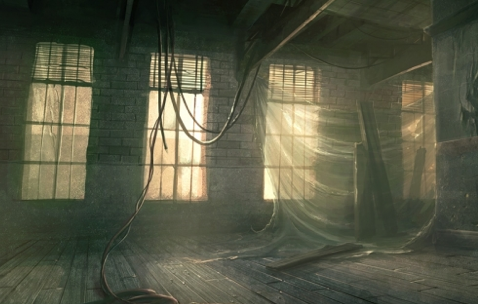
[3] A woman’s (or man’s) jealousy of her (or his) best friend takes over their life . Could link to ‘Othello’ or ‘Medusa’. Think about why. Start this when the woman is with her friend in a frenzy of jealousy…

[4] A model who has always been obsessed with her looks has acid splashed in her face and is disfigured. Could link to ‘Les Grands Seigneurs’, or ‘Mirror’ by Sylvia Plath. Start this with her looking in the mirror then opening her front door… By the way, this story is true. The woman in the picture is called Katie Piper .

[5] Fear of heights : nine year old with family who are in visiting a famous tall tower for the first time. The rest of her family want to go up the tower, but if the child won’t go up, someone will have to stay behind with them. Start this at the foot of the tower…
Want more ideas? Get a complete set plus a teaching scheme with model essays and all resources on my TES Resources shop here .
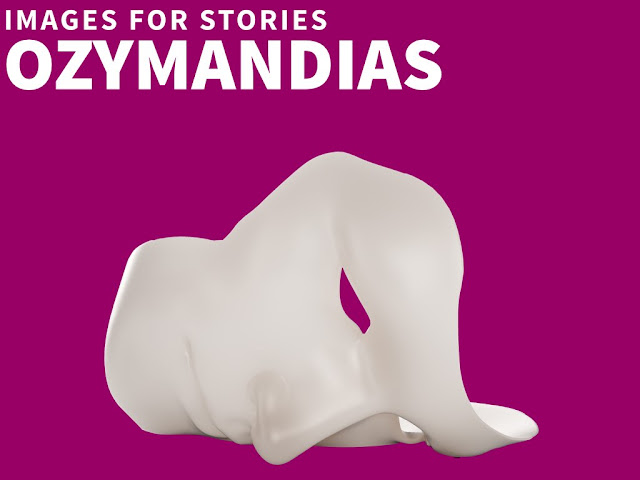
[6] Small child really wants cake but has been forbidden from taking it down from the shelf. Start this story with the child lusting after the cake, which you should describe – baking, decorating etc – in delicious detail. [ read a short, very funny version of this here ]

[7] A man is obsessed with a woman who does not love him back (or the other way round) . Could link to ‘Havisham’ by Carol Ann Duffy, ‘Give’ or ‘Alaska’ by Simon Armitage or ‘The River God’ by Stevie Smith . Start this when he realises she doesn’t love him back or when he decides to do something about it – get a haircut, stop eating raw onions, go to the gym, pretend that he also loves ‘horoscopes’ and ‘shopping’…

[8] Dangerous Ambition (links to Macbeth). Want the lead role in the school play (or to be head girl/boy)? What will you do to get it? Start this when you realise the lead is up for grabs but you’re not the first choice.

Racing Car driver (motorcross, road or drag racer) is up against his old teammate, now his main rival. Driver needs to win this one or it’s the end of his career. He sees that one of the mechanics on his rival’s car has fixed something up wrong. What does he do?

[9] Jealous woman (or man) chases husband (wife) to find out where they’re going. Could link to ‘Medusa’, ‘Havisham’, or ‘Othello’. Start this story when they decide to chase / follow. Use flashback, or recollection to explain why.
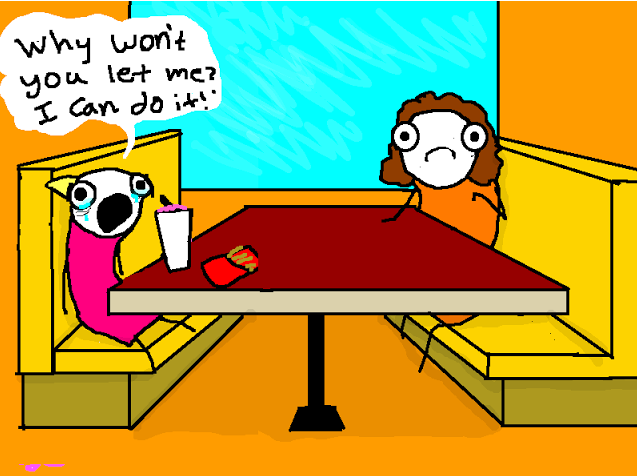
[10] Small child really wants to go to another child’s birthday party but there’s a problem. He has to go to his dad’s that weekend/hasn’t been invited/has to go to the dentist instead. How does he deal with or solve it? Start this story at the moment where the child realises he can’t go. [ read a short, hilarious one here ] III Lost

[11] An old man, who has never cooked or cleaned for himself, has just got home after his wife died (of old age, in hospital). You could link this to ‘Old Age Gets Up’ by Ted Hughes. Now he has to try to do housework – cook, etc. Could be comic / tragic.
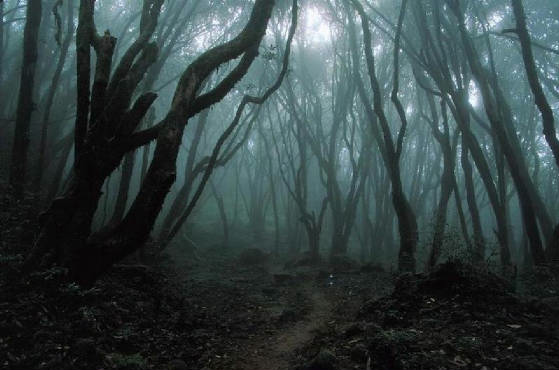
[12] You go for a forest walk (e.g. on a Geography trip or DofE) with someone you don’t like much from school and get lost. Could link to Robert Frost’s poem ‘The Road Not Taken’, ‘Storm in the Black Forest’ by D.H. Lawrence or ‘Wind’ by Ted Hughes. Start this story just before the main character begins to suspect they are lost. Start funny, ends up scary as it starts to go dark. Get describing words for a forest story here .

[13] Parent-Child: In a busy town centre, a mother loses her child who has previously been annoying her . Link this to ‘Mother A Distance Greater…’ by Simon Armitage, ‘Catrin’ by Gillian Clarke or ‘My Father Thought it Bloody Queer’. Start this with the child’s tantrum, mother’s thoughts then quickly move to realising the child is gone.

[14] World famous BMXer (or other sports person, footballer, skateboarder, surfer) is in a car crash – or other accident – and loses his leg. Will he ever ride again? This can link to ‘Out, Out-‘ by Robert Frost. For more on the guy in the photo see this video . Start this story when he wakes up in a hospital bed.

[15] A bsent father returns trying to spend time with his kids. How do they react to seeing him after so long? [this idea is done beautifully in the story, ‘Compass and Torch’ in the AQA anthology Sunlight on the Grass]. You could also link this to ‘Follower’ by Seamus Heaney. Start this when the re’s a knock at the front door.
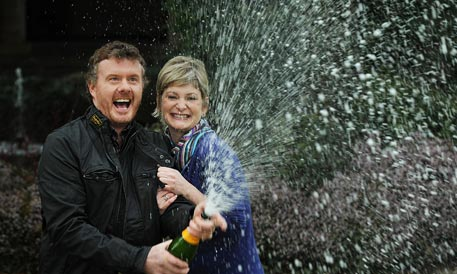
[16] You win a million pounds on the lottery. Everyone you know wants some. What would you buy? Friendships are ruined. Then you are robbed… Start this when you check your bank balance and there are sooooo many noughts at the end it looks like a bank malfunction. IV Coming of Age
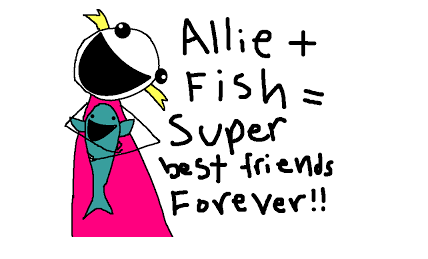
[17] Death of a pet. Ferociously funny, very short story about a girl and a fish [ here ]. Start this when you find the pet… dead, or just before. You can use flashback – when you first got the pet, etc.

[18] Learning a secret you wish you’d never found out – e.g. finding texts on your dad’s mobile from his girlfriend while your parents are still married – or learning that your mum is planning to secretly leave your dad. Start this when you’re just idly messing with the parent’s phone or laptop.
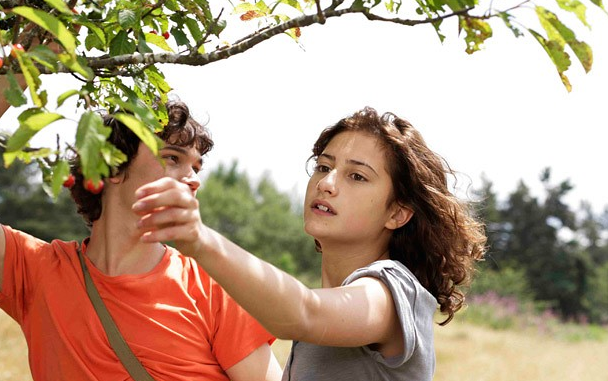
[19] falling in love for the first time , as in Romeo and Juliet. Start this when they see each other or their first proper meeting. Link this to ‘Sonnet 18 Shall I Compare Thee’, ‘Sonnet 116 Let Me Not’, ‘Quickdraw’ or ‘Hour’, by Carol Ann Duffy or ‘To His Coy Mistress’ by Andrew Marvell.

[20] The first time you have to do a really disgusting piece of housework / cook a meal for yourself and how you tackle it. Start this when you realise that no one else is going to do this foul job except you. Read a description of cooking a meal here .
V The Chase / Monsters

[21] You’re camping with your friend in the woods. Then you hear a noise outside (wolves, person, etc). Start this as you’re getting settled to go to sleep – then you hear snuffling (or whatever). Read Bill Bryson’s hilarious account of this exact event, and also an account of surviving a bear attack from the OCR exam paper here.

[22] You have something someone else wants – gold, diamonds etc. They chase you to get it. You choose the landscape: city, ruined derelict warehouses, Brazil, forest, cliffs etc. Start this at the moment you realise someone is following you. You can link this to the final chapter of Lord of the Flies .

[23] You are the last surviving human after the zombie/vampire apocalypse. Now they have found you. This is the plot of ‘I Am Legend’. You can link this to Edwin Muir’s post-apocalyptic poem ‘Horses’, ‘Wind’ by Ted Hughes or the final chapter of Lord of the Flies . Start this at the moment you (or the main character) realises someone is coming towards your hiding place.
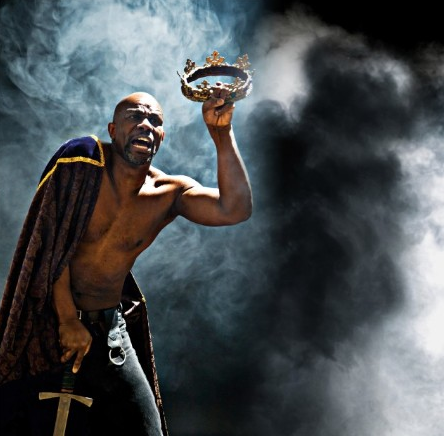
[24] The King is a tyrant who has killed your family. Now you will take revenge . Start this story as you are just about to go through the city walls.
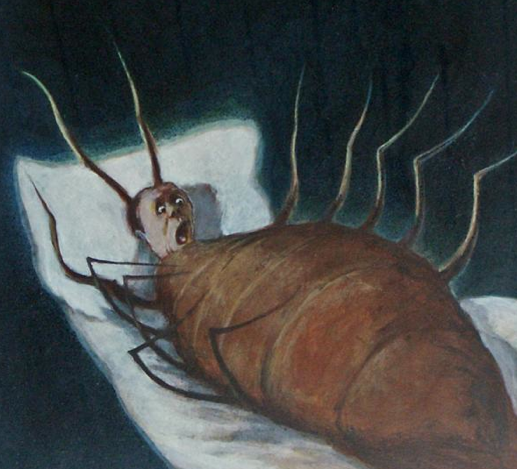
[25] You wake up and discover you have been turned into a giant insect. How does your family react? This is the plot of Kafka’s Metamorphosis. Read this here . Start at the point you wake up, and gradually realise what has happened.
Submit a Comment Cancel reply
Your email address will not be published. Required fields are marked *
Save my name, email, and website in this browser for the next time I comment.
Recent Posts
- Example English Literature Essays For Oxbridge Applications and Coursework
- What is Pathetic Fallacy? Simple Explanation for GCSE, IGCSE, and Common Entrance
- Writing to Describe Photographs of Interesting Places
- Storm on the Island Heaney: Context, Interpretation and Annotation Analysis
- The Prelude, Wordsworth: Context, Analysis, Annotation and Likely Exam Questions GCSE Poetry Exam
Recent Comments
English Language & Creative Writing
Book an Open Day
On our English Language and Creative Writing course you’ll develop the skills and techniques you need to write in a whole range of genres. You’ll also study the history, use and application of English.
On this course we’ll help you to enhance your skills as a creative writer and gain experience of writing in a wide range of different styles and genres.
You’ll develop the skills and techniques you need to create new works in everything from science fiction and fantasy to fairy tales, horror, crime, and fiction for children and young adults. Along the way you’ll produce a variety of short stories, poetry, play scripts and more.
Our modules enable you to delve beneath the surface of language to explore the connections between sound and meaning, and understand how English has developed over time.
Why study with us
- 1 st in the UK overall Guardian University Guide (Creative Writing) 2023/24
- 2 nd in the UK for student satisfaction Complete University Guide (Creative Writing) 2023/24
- You will have opportunities to go on field trips to museums, archives and theatres – from the Royal Shakespeare Company in Stratford-upon-Avon to Wordsworth’s Dove Cottage in the Lake District.
- You’ll have the chance to learn about careers in writing and the book trade from guest authors, literary agents, editors and publishers.
- Our unique English Language Skills Initiative for Employability (ELSIE) programme gives you opportunities to gain vital work experience in public relations, client publications, copywriting and other areas.
What you'll do
- Hear from guest speakers and guest expert insights into success in the writing profession and other related careers.
- Choose from a wide range of modules across different areas of language and linguistics.
- Interested in a teaching career? We have great links with schools across the region.
Compulsory modules
These modules are set and you have to study these as part of your course.
Story Shapes: Drama, Structure & Plot
Enable you to practice a variety of techniques for writing fiction and drama and reflect critically on your writing process Develop a critical and theoretical understanding of the ‘principles of story’ in historical and contemporary context Develop your ability to read, interpret and evaluate contemporary fiction and drama in light of the way it conforms to or challenges these principles Enable you to recognise the connections between fiction and drama as well as the unique challenges and possibilities of writing for page or performance.
Exploring Form and Genre
This module focuses on exploring diverse genres while fostering imaginative engagement. You'll also develop critical analysis and writing skills, fostering an understanding of language use within various contexts and encouraging self-reflective growth as a writer.
Meaning in Interaction
This module will explore different approaches to ‘meaning’, focusing on aspects of meaning at the level of text and discourse. The module will explore the relation between linguistic expressions, language users and contexts. You will apply knowledge of critical discourse analysis, conversation analysis and rhetorical theory to the analysis of short texts (newspapers, political discourse, forensic texts, etc.).
ELSIE (English Language Studies Initiative for Employability)
This module enables you to focus on your subject-specific writing and research skills. You'll also learn more about your personal learning styles and explore how to get the most out of your university experience. You'll learn about punctuation for proofreading and correction, academic writing, and career planning.
Sounds and Structures of English
This module is an introduction to the analysis of sounds, words and sentences. You will explore features of your own accent and learn how to represent Received Pronunciation in symbols. You will learn about traditional grammatical terminology, as taught on the National Curriculum for English, and how to analyse sentences into their component parts.
Optional modules
Depending on how many compulsory modules you take, you may be able to choose optional modules to make up your course.
Literary Landscapes
This module will develop your global writing analysis skills, with the option of creating original creative work. You'll explore modern approaches to portraying landscapes across various genres. Theoretical aspects cover literature's connections to place, environmental concerns, and globalisation. You'll hone English language skills for academic writing and research, and gain insights into the publishing industry and opportunities.
Language Variation in Society
The aim of this module is to introduce you to key themes from socially-minded areas of linguistics and make you aware of the existence of linguistic variation in society. You will also be introduced to the idea that language use can influence and construct meanings and identities.
Language, Gender and Identity
We'll introduce you to various concepts from sociolinguistics, discourse analysis and pragmatics. You'll develop an understanding of how linguistic identities are formed and observed. You'll also understand the methods used in sociolinguistic research and its gender approaches.
Writing Adaptations
Writing Adaptions introduces a range of genres, including literary and popular forms. You will examine the adaptations of an original text and evaluate similarities and differences. You will consider the extension, prequel, sequel, point of view, setting, period, and culture. You will reflect on your writing practice as well as your technical abilities.
Reading and Writing the Short Story
To engage with and critique the theory and practice of writing short fiction. To practice the techniques of writing short fiction and writing about this form/genre. To develop a critical and theoretical understanding of the short story as a distinct form in historical and contemporary contexts and markets. To encourage critical reading, selectivity and focused consideration of short fiction writers and their potential influence on contemporary writing practice.
Language and Literature
This module uses linguistic approaches to better understand poetic language, literary effect and style. You will use a range of texts from different literary periods to explore foregrounding, speech and thought representation, metaphor, point of view, dramatic dialogue, rhythm and metre and other ‘sound effects’.
Academic Writing and Graduate Development
This module will develop your academic and transferable career skills. You will adopt lifelong reflective practices for independent and collaborative working. You’ll also develop decision-making and problem-solving skills. You’ll even have the opportunity to support and mentor others.
Creative Writing for Children and Young Adults
This module will teach you the techniques of writing for children. You'll develop your skills in reading, interpreting and evaluating current children's' literature and use context to critique them. You'll explore aspects such as tone of voice, setting, character and structure. You'll reflect upon the relationships between theory and practice and understand the roles of professionals.
Reading and Writing Fairy Tales
This module will provide you with an exciting experience to revisit your favourite childhood tales. The major European collections of tales, such as those of Perrault, Grimm and Andersen, will provide the main focus of study, but non-European collections will also be considered.
Sociolinguistics
This module will introduce you to the basic concepts and methods of Sociolinguistics. You will examine the progression of Sociolinguistics in language and society.
Framing the News
In this module, you will investigate how the media influences public perceptions of the social world by promoting or focusing selectively on particular aspects or definitions of controversial issues in order to elicit a particular response from an audience. In particular, you will relate different ways of framing the same issues to various types of newspapers and their political/ideological orientation.
Language, Mind and Brain
This module aims to familiarise you with psycholinguistics, lines of enquiry, and research methods. It enables you to understand what the study of first language acquisition and disordered communication reveals about the storage and processing of language and develop your analytical, researching, and writing skills.
Metaphor and Meaning
In this module you will be introduced to the basic concepts and approaches in semantics, historical, lexical, cognitive semantics and with the main theories of sense and reference.
History of English
Using the details of the history of English, this module explores how and why languages change. You will explore the social contexts which trigger change as well the linguistic outcomes of change. In addition to considering the Germanic origins of English, you will document the key features associated with Old English, Middle English, as well as Shakespeare’s and Austen’s English.
Approaches to Syntax
This module builds on the skills developed on LG1220 Introduction to English Syntax and Phonology. It introduces terminology, analytic skills and grammatical architectures which, a, are in widespread use in the current syntactic literature, and which, b, can be developed further in English Syntax and World Grammars at level 6. Where relevant, explicit links will be made between grammatical constructions and punctuation. Grammatical terminology will be linked to the teaching requirements of the National Curriculum for English.
The Creative Writing Dissertation
Our specific creative writing dissertation module will give you the chance to showcase all your skills that you have developed over the entirety of your course. You will produce an independent piece of work on your chosen genre by applying critical thinking to extensive research processes.
Experimental Fiction
To enable you to practice experimental techniques for writing fiction and reflect critically on your writing process To develop a critical and theoretical understanding of experimental fiction in historical and contemporary context To encourage you to discuss, debate and challenge terms, definitions and genre boundaries To enable you to develop and communicate your own manifesto for experiment.
English Language & Linguistics dissertation
You'll undertake a research project, which typically – though not necessarily – involves the collection and analysis of linguistic data. This includes producing a textual commentary, analysis or critique. A literature review or similar is deemed to be original if it constitutes a critical synthesis not already available from any single existing source.
Reading and Writing for Children and Young Adults
You'll begin by examining audience and the different bands within children’s literature. Explore a range of techniques including voice, character, setting and structure, as well as how to write and critique specific sub-genres. Gain an understanding of the current trends, the relationship between words and images and issues such as appropriate language and subject matter, censorship and the gatekeepers who inform and shape what children read.
Life Writing
This module will explore the creative and critical possibilities of life-writing. You will examine a number of examples that demonstrate the different forms and approaches that life-writing can take including creative nonfiction, memoir, the lyrical essay, travel writing etc., autobiographical performance, and poetry. You will be introduced to the theory and criticism of life-writing including ideas around memory and the ethics of self-representation. You will be encouraged to experiment through a number of practical writing exercises as well as developing your final idea through the process of workshopping, giving and receiving feedback and deciding how to implement it in your final draft. You will be encouraged to consider the contemporary market for publishing within this form as well as to discuss and challenge the boundary between ‘creative’ and ‘critical’ writing.
Otherworlds: Reading and Writing Science Fiction and Fantasy
On this module you'll develop your knowledge and skills of writing for science fiction and fantasy. You'll gain a theoretical and historical understanding of the genres and how to critically approach texts. You will be expected to familiarise yourself with a range of critical material and different fantasy and science fiction short stories, and to show evidence of your understanding in class discussions and your written work.
Literature into Film
This module aims to help you to evaluate the relationship between fictional and filmic texts. You will investigate the extent to which such texts are the product of social, political, cultural and generic contexts. This module will help with more opportunities to analysis different written assessments.
Language and Power
The aim of this module is to introduce you to the concept of 'power'. You will have the opportunity to examine the effect of power on and in language.
Forensic Linguistics
On this module, you'll study language as criminal evidence, covering frameworks like authorship analysis, plagiarism detection, and police interview evaluation. You'll engage in the analysis of documents (eg, ransom notes, terrorist materials, police interviews) from a forensic linguistics perspective.
Clinical Linguistics and Language Pathology
Clinical linguistics examines language disorders and delays (acquired and congenital). This module covers various language-related pathologies like auditory processing disorder, aphasia, autism, and more. These pathologies and their causes are discussed, providing insights into the cognitive foundations of language.
English Phonology
Our module takes a theoretical approach to English phonology, building on the basic descriptive approach to English phonology studied in previous modules. You will study the basic components of phonological forms; the ways in which they can combine together; rules governing accentuation and morphophonology.
English Syntax
This module aims to develop your understanding of theoretical challenges that language presents, present a theory of language and English, expose you to theorising in practice and as a mode of intellectual enquiry, expand your awareness and understanding of English grammar. It also aims to expand your experience of studying ideas with the ideas’ originator.
World Grammars: contrastive linguistics
On this module you'll consider the similarities and differences between the world’s language and engage with questions of universality. You will learn how to categorise/group languages, including English, according to structural type. You'll also have the opportunity to contrast some aspect of a second language with their native language, so that they can better explain second language errors.
Discourse, Argumentation, Rhetoric
This module introduces you to the practices of argument identification, analysis, reconstruction, analysis and evaluation, and critical thinking. You'll cover standard argument schemes and rhetorical analysis techniques, including the use of ethos, pathos, and logos for enhancing persuasive political discourse.
English in Education
The aims of this module are to examine the contribution of Linguistics to the teaching of English Language as a first language. The module focuses primarily on the current policies and approaches to the teaching of literacy and English in the compulsory sector in the UK.
Every effort has been made to ensure the accuracy of our published course information. However, our programmes are subject to ongoing review and development. Changing circumstances may cause alteration to, or the cancellation of, courses. Changes may be necessary to comply with the requirements of accrediting bodies or revisions to subject benchmarks statements. As well as to keep courses updated and contemporary, or as a result of student feedback. We reserve the right to make variations if we consider such action to be necessary or in the best interests of students.

Get to know us
Book an Open Day to get a feel for our campuses and meet current students and staff. It's the perfect way to get a taste of university life.
View the course facilities

Future careers
Recent English Language and Creative Writing graduates have gained success in the worlds of publishing, writing, travel and tourism, advertising, journalism and the media. Others have pursued careers in management, commerce and public service.
We’ll give you lots of advice on how to build a successful career using your English Language and creative writing skills – we regularly host panels where professional writers, editors, literary agents and publishers provide valuable insights into their careers.
Graduates from this course have pursued a range of careers in writing and related fields, such as travel writing, play and script writing. They have also progressed to careers in travel, retail and marketing.
You will also be well equipped for entry into graduate professions in local government and public services, as well as graduate entry schemes.
Are you interested in a career in teaching and education? We have links with a network of schools in the region. You could go on to gain a PGCE in primary or secondary education, or a certificate in Teaching English to Speakers of Other Languages (TESOL).
Fees and funding
Additional costs.
As part of your course there may be additional costs to consider that are not included in your tuition fees. Most of these will be optional, but some courses have essential additional costs. Find out more about additional costs .
Scholarships and bursaries
We have a wide range of bursaries, scholarships and funds available to help support you whilst studying with us.
Select your country to see eligibility information and how to apply by selecting more info on the cards below.
Care Leaver Bursary
Our Care Leaver Bursary is for students who need extra support because they have been in care or are estranged from their parents.
Estranged student support
Estranged Student Support Bursary is for students who need extra support because they are estranged from their parents.
Dependants Bursary
Students with financially dependent children may be eligible for our Dependants Bursary as part of our financial support package.
Financial Bursary
If you are from a low income household our Financial Bursary may be able to help.
Learning and assessment
A key feature of our BA in English Language and Creative Writing is choice:
On the Language side, you could choose to learn about how language is structured (syntax, phonetics and phonology, morphology), how language varies according to user and context, or the teaching of language – the choice s yours. You can also specialise in areas such as the media or forensic and political discourse.
On the Creative Writing side, you’ll get to develop your writing in a wide range of genres, from short stories to radio and film scripts. We’ll encourage you to reflect on the creative process and understand the journey from having an initial idea to transforming it into a new piece of work. Our modules are aimed at enhancing your written and verbal and communication skills, learning about careers in writing, and enhancing your employability. Along the way you’ll get to hear from guest authors, literary agents, editors and publishers.
The course involves a combination of lectures, seminars and workshops. You’ll have access to a dedicated English Language Laboratory, where you can use specialised computer applications for linguistic analysis. Creative Writing classes are taught in workshops, where you’ll get to work in small groups and share ideas.
Through our unique English Language Skills Initiative for Employability (ELSIE) project you’ll have the opportunity to gain experience in work-based activities such as copywriting, PR and press releases, producing brochures for clients, and more. Recent student projects have included taster sessions in local colleges, writing articles for community groups and designing resources for schools.
Throughout the course you’ll benefit from expert support from your tutors. We’ll encourage you to continually develop yourself. You’ll get the chance to gain valuable work experience through live projects – these could entail planning a literature festival, writing competition, reading project or other creative endeavour.
Through the Worldwise Centre, based in the School, you’ll get the opportunity to gain further practical experience through five day placements and short-term internships, as well as access the latest language learning and digital technologies (including Rosetta Stone).
This course is based in the School of Psychology and Humanities
For information on possible changes to course information, see our essential and important course information
You can find regulations and policies relating to student life at the University of Central Lancashire on our student contract page
This degree is approved for distance education by the WSCUC.
Bachelor of Arts in English
Program planners for each option are available on the Department website or in the Department office. Students should consult with Department faculty advisors when choosing a program in English and regularly as they progress towards their degrees.
The Department of English can refer students to one of the coordinating faculty advisors. Regular office hours for all English faculty are posted near the Department office, and information sheets are available detailing which faculty members regularly advise for specific options.
ENGL 100B , a general education foundation course, is not part of any English option. Some options permit or require courses from other departments; if approved by a faculty advisor, options may also include other courses outside English. Because some courses meet requirements in several options, students can often change options with no significant loss of credit towards the required total; students also regularly double major in two options in English.
In addition to the degree requirements for the Bachelor of Arts in English, English majors must meet the following requirements for University graduation:
- Each lower division course counted towards the English major must be completed with a grade of “C” or better. A course in which a grade lower than a “C” is received must be retaken and successfully completed prior to enrolling in any course for which it is a prerequisite.
- ENGL 380 , required of all English majors, must be completed with a grade of “C” or better. If a grade lower than a “C” is received, ENGL 380 must be retaken and successfully completed with a grade of “C” or better prior to enrolling in any course for which it is a prerequisite.
Option in Creative Writing
(120 units)
The Creative Writing option is designed for students who wish to write as well as study fiction, poetry, or creative non-fiction. Exposure to traditional and recent literature is essential for anyone seeking to master the forms and conventions of writing creatively for the literary marketplace.
This option consists of 45 units, 31 of which must be taken in the upper division, including the following:
Lower Division:
Take all of the following (11 units total):.
- ENGL 180 - Appreciation of Literature (3 units)
- ENGL 250A - Survey of English Literature (4 units)
- ENGL 250B - Survey of English Literature (4 units)
- ENGL 270A - Survey of American Literature (4 units)
- ENGL 270B - Survey of American Literature (4 units)
Take one of the following:
- ENGL 204 - Introduction to Creative Writing: Creative Nonfiction (3 units)
- ENGL 205 - Introduction to Creative Writing: Fiction (3 units)
- ENGL 206 - Introduction to Creative Writing: Poetry (3 units)
Upper Division:
Take one of the following courses (3 units):.
- ENGL 304 - Intermediate Creative Writing: Creative Nonfiction (3 units)
- ENGL 305 - Intermediate Creative Writing: Fiction (3 units)
- ENGL 306 - Intermediate Creative Writing: Poetry (3 units)
- ENGL 307 - Intermediate Creative Writing: The Novel (3 units)
Take the following:
- ENGL 380 - Approaches to English Studies (4 units)
Take nine units from the following:
- ENGL 404 - Creative Writing: Creative Nonfiction (3 units)
- ENGL 405 - Creative Writing: Short Story (3 units)
- ENGL 406 - Creative Writing: Poetry (3 units)
- ENGL 407 - Creative Writing: Novel (3 units)
- ENGL 499 - Directed Studies (1-3 units)
Take three of the following classes in recent literature, literary genres, major writers, and literary criticism:
- ENGL 340 - American Indian Literature (3 units)
- ENGL 370 - Chicana/o and Latina/o Literature (3 units)
- ENGL 385 - The Short Story (3 units)
- ENGL 386 - Poetry (3 units)
- ENGL 459 - English Literature of the Twentieth Century (1900‑Present) (3 units)
- ENGL 460 - Anglophone Postcolonial Literature (3 units)
- ENGL 466 - Irish Literature in English (3 units)
- ENGL 467A - The English Novel (3 units)
- ENGL 467B - The English Novel (3 units)
- ENGL 469 - Selected Topics - Major English Writers (4 units)
- ENGL 470 - American Ethnic Literatures (3 units)
- ENGL 474 - Twentieth-Century American Literature (3 units)
- ENGL 475 - The American Short Story (3 units)
- ENGL 476A - American Poetry (3 units)
- ENGL 476B - American Poetry (3 units)
- ENGL 477A - The American Novel (3 units)
- ENGL 477B - The American Novel (3 units)
- ENGL 478 - American Drama (3 units)
- ENGL 479 - Selected Topics - Major American Writers (4 units)
Take electives to make up a total of 45 units chosen from the classes listed above and/or any upper-division English courses.
Program Code: 233*/233B CIP Code: 23.0101
General Education Requirements (44 Hours)
- General Education Requirements
Some general education requirements may be double-counted in the major with departmental approval. Please see your advisor for information.
Language Requirements (3 Hours)
Students are required to demonstrate intermediate-level proficiency in a language other than English. Intermediate-level proficiency is demonstrated by successful completion of a 4th-semester language course in one of the following:
- Intermediate Language Course II * or
- Combined Intermediate Language Course * or
- Higher level language courses (A higher-level language course that requires one of the above listed courses as a prerequisite may also be used to fulfill the language requirement.)
Note: Beginning language course I & II or beginning combination language course and intermediate language course I are prerequisites for *intermediate level II course. Placement tests are designed for placement purposes only and a score on this test alone is not sufficient to demonstrate intermediate-level proficiency.
Language courses 1050 or 1060 may be used in General Education Liberal Studies Experience.
Major Requirements (39 Hours)
2.0 major GPA is required for graduation. Major GPA calculation will include all courses taken in the major discipline, plus any other courses under Major Requirements.
36 semester hours above the 2001 level; 24 semester hours must be at the 3000 level or above. RC 1000 a prerequisite for all ENG & RC courses level 2001 and above.
Writing Courses (9 Hours)
At least three (but no more than five) of following : (+ course may be repeated for credit when content varies)
- ENG 3651 - Creative Writing: Poetry (3)
- ENG 3652 - Creative Writing: Prose (Fiction) (3)
- ENG 3661 - Advanced Poetry (3) +
- ENG 3662 - Advanced Fiction (3) +
- ENG 3663 - Advanced Creative Non-Fiction (3) +
- ENG 3670 - Playwriting (3) +
- THR 3670 - Playwriting (3) +
- ENG 3679 - Screenwriting (3)
- THR 3679 - Screenwriting (3)
- ENG 3680 - Literary Journalism (3)
- COM 3680 - Literary Journalism (3)
- ENG 4550 - Senior Seminar in Creative Writing (3) [CAP] +
- ENG 4815 - Distinguished Guest Seminar in Creative Writing (3) [CAP] +
Literature Courses (3 Hours)
Choose at least one of the following genre courses:
- ENG 3720 - Studies in the Short Story (3)
- ENG 3740 - Studies in Poetry (3)
- ENG 3750 - Studies in Drama (3)
Grammar (3 Hours)
- ENG 3300 - Applied Grammar (3)
Writing in the Discipline (3 Hours)
- ENG 3000 - Approaches to Literary Studies (3) [WID]
Senior Capstone (3 Hours)
Choose 3 hours.
- ENG 4510 - Senior Honors Thesis (3) [CAP]
- ENG 4550 - Senior Seminar in Creative Writing (3) [CAP]
- ENG 4571 - Capstone in American Indian Literature (3) [CAP]
- ENG 4581 - Capstone in African-American Literature (3) [CAP]
- ENG 4586 - Capstone in Ethnic American Literature (3) [CAP]
- ENG 4592 - Capstone in Topics in World Literature (3) [CAP]
- ENG 4711 - Capstone in Women and Literature (3) [CAP]
- ENG 4721 - Capstone in Appalachian Literature (3) [CAP]
- ENG 4726 - Capstone in Southern Literature (3) [CAP]
- ENG 4731 - Capstone in the Novel (3) [CAP]
- ENG 4761 - Capstone in Literary Criticism (3) [CAP]
- ENG 4771 - Capstone in Early American Literature (3) [CAP]
- ENG 4781 - Capstone in American Literature: 1783-1865 (3) [CAP]
- ENG 4786 - Capstone in American Literature: 1865-1914 (3) [CAP]
- ENG 4791 - Capstone in Modern American Literature: 1914-1960 (3) [CAP]
- ENG 4796 - Capstone in Contemporary American Literature: 1960-present (3) [CAP]
- ENG 4811 - Capstone in Folklore (3) [CAP]
- ENG 4815 - Distinguished Guest Seminar in Creative Writing (3) [CAP]
- ENG 4821 - Capstone in Medieval British Literature (3) [CAP]
- ENG 4826 - Capstone in Literature of the Middle Ages (3) [CAP]
- ENG 4841 - Capstone in Shakespeare: Later Works (3) [CAP]
- ENG 4851 - Capstone in Renaissance Literature (3) [CAP]
- ENG 4861 - Capstone in Restoration and Eighteenth Century Literature (3) [CAP]
- ENG 4871 - Capstone in British Romantic Literature (3) [CAP]
- ENG 4881 - Capstone in Victorian Literature (3) [CAP]
- ENG 4891 - Capstone in Twentieth Century British Literature: 1900-1945 (3) [CAP]
- ENG 4896 - Capstone in Twentieth Century British Literature: 1945-present (3) [CAP]
- ENG 4899 - Capstone in Topics in Irish Literature (3) [CAP]
Foundation in Literacy History (18 Hours)
Honors courses are indicated by section number - 410 on the Schedule of Courses .
British Literature - Choose one (3 Hours)
- ENG 2010 - British Literature to 1789 (3)
- ENG 2020 - British Literature since 1789 (3)
World Literature - Choose one (3 Hours)
- ENG 2030 - World Literature to 1650 (3) [GenEd: LS]
- ENG 2040 - World Literature since 1650 (3) [GenEd: LS]
American Literature - Choose one (3 Hours)
- ENG 2310 - American Literature to 1865 (3)
- ENG 2320 - American Literature since 1865 (3)
4000 Level Literature Courses - Choose Two (6 Hours)
4000 level english elective - (3 hours).
If ENG 4550 taken to meet Writing Course above (not just Capstone) , then one 3000 level or higher course can be taken to meet this requirement
Minor Required (12-21 Hours)
- Minimum of 9 semester hours of courses taken to fulfill minor requirements must be courses offered by Appalachian
Electives (13-22 Hours)
Taken to total 120 hours for the degree
Total Required (120 Hours)
Eduqas GCSE English Language Past Papers
The Eduqas GCSE (9-1) English Language (C700U) past exam papers section of Revision World. You can download the papers and marking schemes by clicking on the links below.
November 2022 Eduqas GCSE (9-1) English Language Past Papers (C700U)
English Language - Component 1: 20 th Century Literature Reading and Creative Prose Writing (C700U10-1) Download Paper - Download Mark Scheme
English Language - Component 2: 19 th & 21 st Century Non-fiction Reading and Transactional/ Persuasive Writing (C700U20-1) Download Paper - Download Mark Scheme
June 2022 Eduqas GCSE (9-1) English Language Past Papers (C700U)
November 2020 Eduqas GCSE (9-1) English Language Past Papers (C700U)
English Language - Component 1: 20 th Century Literature Reading and Creative Prose Writing (C700U10-1) Download Paper – Download Resource Book - Download Mark Scheme
English Language - Component 2: 19 th & 21 st Century Non-fiction Reading and Transactional/ Persuasive Writing (C700U20-1) Download Paper – Download Resource Book - Download Mark Scheme
November 2019 Eduqas GCSE (9-1) English Language Past Papers (C700U)
English Language - Component 1: 20 th Century Literature Reading and Creative Prose Writing (C700U10-1) Download Paper – Download Resource Book - Download Mark Scheme
English Language - Component 2: 19 th & 21 st Century Non-fiction Reading and Transactional/ Persuasive Writing (C700U20-1) Download Paper – Download Resource Book - Download Mark Scheme
June 2019 Eduqas GCSE (9-1) English Language Past Papers (C700U)
English Language - Component 2: 19 th & 21 st Century Non-fiction Reading and Transactional/ Persuasive Writing (C700U20-1) Download Paper – Download Resource Book - Download Mark Scheme
November 2018 Eduqas New GCSE (9-1) English Language Past Papers (C700U)
English Language - Component 1: 20 th Century Literature Reading and Creative Prose Writing (C700U10-1) Download Paper – Download Mark Scheme
English Language - Component 2: 19 th & 21 st Century Non-fiction Reading and Transactional/ Persuasive Writing (C700U20-1) Download Paper – Download Mark Scheme
June 2018 Eduqas GCSE (9-1) English Language Past Papers (C700U)
English Language - Component 1: 20 th Century Literature Reading and Creative Prose Writing (C700U10-1) Download Paper – Download Resource Book - Download Mark Scheme
English Language - Component 2: 19 th & 21 st Century Non-fiction Reading and Transactional/ Persuasive Writing (C700U20-1) Download Paper – Download Resource Book - Download Mark Scheme
November 2017 Eduqas GCSE (9-1) English Language Past Papers (C700U)
English Language - Component 1: 20 th Century Literature Reading and Creative Prose Writing (C700U10-1) Download Paper – Download Resource Book - Download Mark Scheme
June 2017 Eduqas New GCSE (9-1) English Language Past Papers (C700U)
English Language - Component 1: 20 th Century Literature Reading and Creative Prose Writing (C700U10-1) Download Paper – Download Mark Scheme
English Language - Component 2: 19 th & 21 st Century Non-fiction Reading and Transactional/ Persuasive Writing (C700U20-1) Download Paper – Download Mark Scheme
For other GCSE English Language past papers click here .


COMMENTS
Creative writing is an art form that transcends traditional literature boundaries. It includes professional, journalistic, academic, and technical writing. This type of writing emphasizes narrative craft, character development, and literary tropes. It also explores poetry and poetics traditions.
In summary, here are 10 of our most popular creative writing courses. Creative Writing: Wesleyan University. Write Your First Novel: Michigan State University. The Strategy of Content Marketing: University of California, Davis. Sharpened Visions: A Poetry Workshop: California Institute of the Arts. Good with Words: Writing and Editing ...
Writing skills - creative and narrative writing. Part of English Writing skills. Imaginative or creative writing absorbs readers in an entertaining way. To succeed with this kind of writing you ...
Types of Creative Writing. Examples of creative writing can be found pretty much everywhere. Some forms that you're probably familiar with and already enjoy include: • Fiction (of every genre, from sci-fi to historical dramas to romances) • Film and television scripts. • Songs. • Poetry.
Remember, creative writing is an opportunity to express yourself and let your imagination run wild. With these tips and consistent practice, you can excel in your GCSE English Language creative writing exam look forward to results day and enjoy the process of crafting your own unique stories. About the author: Thomas Brella
This free and open access textbook introduces new writers to some basic elements of the craft of creative writing in the genres of fiction, poetry, and creative nonfiction. The authors—Rachel Morgan, Jeremy Schraffenberger, and Grant Tracey—are editors of the North American Review, the oldest and one of the most well-regarded literary magazines in the United States.
Here's how our contest works: every Friday, we send out a newsletter containing five creative writing prompts. Each week, the story ideas center around a different theme. Authors then have one week — until the following Friday — to submit a short story based on one of our prompts. A winner is picked each week to win $250 and is highlighted ...
8. How to breathe. A "how-to" is a type of writing that describes how to do something step-by-step. Most how-to's teach the reader something new, like how to bake a chocolate cake or how to use a certain feature on your phone. For this exercise, write a how-to for something a bit… different.
To help you, here are seven tips. Use these tips for creative writing in English - or in Spanish, Polish, Korean - any other language you happen to know! It's a common approach. 1. READING. Creative writing starts with reading - this is the source. You've got to read A LOT. ... He has been involved in English language teaching as a ...
Creative writing can be very stimulating and a lot of fun. Creative writing involves playful but rigorous work with language. A lot of people seem to associate creative writing with an "anything goes" mentality. However, in order to produce a good text, poem, short story or dramatic scene, the language needs to be correct and it needs to work.
Most often, such texts take the form of poems or stories, though they are not confined to these genres. (Letters, journal entries, blogs, essays, travelogues, etc. can also be more or less creative.) In fact, the line between creative writing (CW) and expository writing (ER) is not carved in stone. In general, however CW texts draw more heavily on intuition, close observation, imagination, and ...
Our free online tool helps you to practise your writing and get valuable feedback instantly. Write & Improve is simple to use: just choose a task, write or upload a written response and use the feedback to quickly improve. It shows you how to improve your spelling, grammar and vocabulary. Join over 2 million learners of English who have used ...
Tips and strategies for writing a high scoring GCSE creative writing paper: 1. Learn the formats. Know the different formats and conventions of the different GCSE writing tasks. There is a standard layout for a leaflet, for example, where including contact details and a series of bullet points is part of the mark scheme.
14 Practising creative writing in high school foreign language classes ... Alan Maley has been involved with English language teaching for over 50 years. He worked with the British Council in Yugoslavia, Ghana, Italy, France, China and India (1962-88) before taking over as
II. Desire. [6] Small child really wants cake but has been forbidden from taking it down from the shelf. Start this story with the child lusting after the cake, which you should describe - baking, decorating etc - in delicious detail. [ read a short, very funny version of this here]
On our English Language and Creative Writing course you'll develop the skills and techniques you need to write in a whole range of genres. You'll also study the history, use and application of English. On this course we'll help you to enhance your skills as a creative writer and gain experience of writing in a wide range of different ...
June 2019 AQA GCSE (9-1) English Language (8700) Past Exam Papers. June 2019: Paper 1: Explorations in Creative Reading and Writing (8700/1) Download Insert - Download Past Paper - Download Mark Scheme. June 2019: Paper 2: Writer's Viewpoints and Perspectives (8700/2) Download Insert - Download Past Paper - Download Mark Scheme.
The style of your story writing is closely related to the language you use. For example, in a creative writing response, the best answers show evidence of careful word choice and linguistic techniques. Creative writing helps the reader to visualise the person, place, or situation being described with word choice and linguistic techniques, as ...
ENGLISH LANGUAGE 8700/1 Paper 1 Explorations in creative reading and writing Mark scheme June 2021 Version: 1.0 Final *JUN218700/1/MS* MARK SCHEME - GCSE ENGLISH LANGUAGE - 8700/1 - JUNE 2021 2 Mark schemes are prepared by the Lead Assessment Writer and considered, together with the relevant
Option in Creative Writing (120 units) The Creative Writing option is designed for students who wish to write as well as study fiction, poetry, or creative non-fiction. Exposure to traditional and recent literature is essential for anyone seeking to master the forms and conventions of writing creatively for the literary marketplace.
English - Creative Writing Concentration, BA. Program of Study (opens a new window) | Print-Friendly Page (opens a new window) Program Code: 233*/233B CIP Code: 23.0101. ... Students are required to demonstrate intermediate-level proficiency in a language other than English. Intermediate-level proficiency is demonstrated by successful ...
June 2022 Pearson Edexcel GCSE (9-1) English Language Past Papers (1EN0) Paper 1: 1EN0/01 English Language - Fiction and Imaginative Writing. Download Paper - Download Mark Scheme. Paper 2: 1EN0/02 English Language - Non-Fiction and Transactional Writing. Download Paper - Download Mark Scheme.
November 2020 Eduqas GCSE (9-1) English Language Past Papers (C700U) English Language - Component 1: 20 th Century Literature Reading and Creative Prose Writing (C700U10-1) Download Paper - Download Resource Book - Download Mark Scheme. English Language - Component 2: 19 th & 21 st Century Non-fiction Reading and Transactional/ Persuasive Writing (C700U20-1)
English: Creative Writing, BA 1 ENGLISH: CREATIVE WRITING, BA Degree Requirements Requirements for Students Matriculating in or before Academic Year 2024-2025. Learn more about University Academic Regulation ... a language other than English; etc.). Computer Science courses may not be used to satisfy this requirement. c. In addition to a. and b ...